100
Would the West accept using nuclear weapons on civilians in the Middle East?

During my public education in the United States, I was not taught that President Truman was a war criminal for ordering the nuclear bombing of civilian populations. I was not taught that our government committed war crimes when we deliberately burned tens of thousands of women and children alive in Japan. I was not taught that those responsible should have faced justice and been prosecuted in the way we made war tribunals for the Germans.
Children raised in the United State’s public education system are taught to believe that the moral justifications for mass
murdering those civilians can be a perfectly legitimate perspective.
The indoctrination of the American education system numbed our minds from childhood, and it showed its effects when the time to justify more atrocities came again. We’ve been ready to rationalise war crimes from a time that we may no longer recall when that rationale was put in our minds.
In a study conducted in 2017, researchers presented a hypothetical scenario to a representative set of Americans. The scenario was that Iran responded to sanctions and
attacked a US aircraft carrier in the Persian Gulf, killing 2,403 military personnel (the same number killed in the Pearl Harbor attack). The US responded with large scale airstrikes that destroyed all of Iran’s nuclear infrastructure, air defenses, and all Iranian Air Force bases and planes. The US then began a ground invasion. The invasion eventually stalled, with 10,000 US military casualties. The President of the United States was presented with two options to end the war. The first option was to continue the land invasion to capture Tehran and
Continued on page 3
Hadith-e-Rasul – Sayings of the Holy Prophet Muhammadsa
Parable of the believer and the hypocrite in relation to the Quran
Hazrat Abu Musa al-Ash‘arira narrated: “The Prophetsa said, ‘The likeness of the believer who recites the Quran is that of the citron: its fragrance is pleasant and its taste is pleasant. The likeness of the believer who does not recite the Quran is that of the date: it has no fragrance, yet its taste is sweet. The likeness of the hypocrite who recites the Quran is that of the basil plant: its fragrance is pleasant, but its taste is bitter. And the likeness of the hypocrite who does not recite the Quran is that of the colocynth: it has no fragrance and its taste is bitter.”
(Sahih al-Bukhari, Kitab al-at‘imah, Bab dhikri t-ta‘am, Hadith 5427)
Hazrat Mirza Ghulam Ahmadas, In His Own Words
The hidden hand of God in the matter of Lekhram
In the matter of Lekhram, the hidden hand of God can clearly be seen at
Continued on page 3
15-16 August
15 August 2008: During his Friday sermon in Hamburg, Germany, on this day, Hazrat Khalifatul Masih Vaa mentioned that he had visited Hamburg after a long interval. Huzooraa announced the inauguration of two newly-built mosques in the region: Baitul Karim in Stade and Baitus Sami in Hannover. (Al Fazl International, 5 September 2008, pp. 5-7)
16 August 1946: During his Friday sermon on this day, Hazrat Muslehe-Maudra called on the Muslim world to support the freedom movement in Indonesia. Huzoorra stated that there were around 70


This Week in History
A glimpse into the rich history of the Ahmadiyya Muslim Jamaat 15 - 21 August
remind members of the Jamaat to make a connection with the Khalifa of the time and called their attention towards listening to his Friday sermons and various addresses, then, on the one hand, it would strengthen their bond with Khilafat, while also solving all tarbiyat-related problems.
17 August
18 August
18 August 1928: Sufi Mutiur-Rahman Sahib arrived in Chicago on this day as an Ahmadi missionary. There, he faced a lot of difficulties in the beginning. For more details of his difficulties and success, see: “Pioneer Missionaries: Part 2 – Serving till their last days” at alhakam.org (16 September 2022, p. 9).

17 August 1899: On this day, the Promised Messiah received a letter from Bareilly, Uttar Pradesh, in which the author asked him to write an oath that he was the Messiah prophesied in the Holy Quran and the books of Hadith. The Promised wrote down the requested wording.

( [English], Vol. 2, pp. 4445)



alhakam.org, 24 December 2021, Issue 197, p. 27)
16 August 2013:

During his Friday sermon on this day, Hazrat Khalifatul Masih V


17 August 1980: Hazrat Khalifatul Masih III Amsterdam from London. Huzoor

airport in Amsterdam for a while. Prime Minister Dries van Agt was also present at the airport. When
Khalifatul Masih III



On this day, Hazrat
he sent a message that he had yet to hold a press conference, after which he would come and meet Huzoor
their wish to Huzoor
he visited the Netherlands. (Silsila

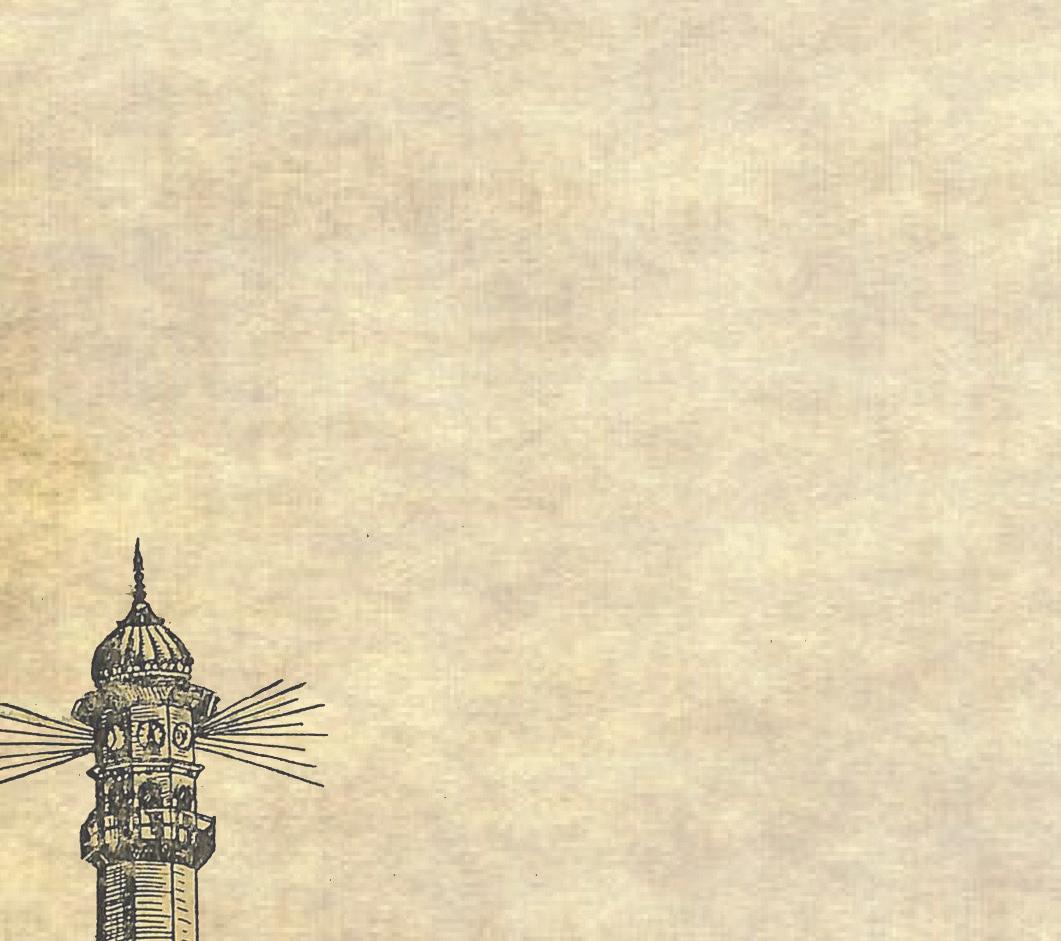

he learnt of the presence of Hazrat and his staff came to the VIP lounge that he would also like to meet him the next time , Vol. 3, pp. 631-632)



18 August 1982: On this day, Walter Wallmann, the mayor of Frankfurt, had a meeting with Hazrat Khalifatul Masih IVrh and discussed issues of mutual interest. (Silsila Ahmadiyya, Vol. 4, p. 816)
19-20 August










“O my Benefactor and O my God! I am Your unworthy servant, laden with sin and heedlessness. You have seen from me wrong upon wrong, yet bestowed favour upon favour; You have witnessed sin upon sin, yet conferred beneficence upon beneficence. You have ever veiled my faults and enriched me with Your countless blessings. So even now, have mercy on this unworthy, sin-laden one, forgive my impertinence and ingratitude, and deliver me from this grief of mine – for none besides You can bring relief. Amin, again Amin.” (Maktubat-e-Ahmad, Vol. 2, 2008, p. 10)

19 August 1962: On this day, Hazrat Nawab Amatul Hafeez Begumra, daughter of the Promised Messiahas, arrived in Hamburg, Germany, during her visit to Europe. At the airport, she was welcomed by Ahmadis living in West Germany. Her visit was prominently featured in major German newspapers.








20 August 2010: During his Friday sermon on this day, Hazrat Khalifatul Masih Vaa mentioned Dr Najam-ul-Hassan Sahib of Karachi and Habib-ur-Rahman Sahib of Sanghar, Pakistan, who were martyred on 16 and 19 August 2010, respectively. (Al Fazl International, 10 September 2010, p. 5)
21 August

About her visit, Chaudhry Abdul Latif Sahib, a missionary at the time, remarked that this visit catalysed significant discussions about Islam in the German press. He said that the Christian objection that Islam does not give any status to women was widely refuted.









He further elaborated, “I specifically emphasised [to the media] that Hazrat Begum Sahibara laying the foundation stone for the mosque being constructed in Zurich stands as a testament to the elevated status of women in Islam.” (Tarikh-e-Ahmadiyyat, Vol. 21, pp. 451-455)





21 August 1923: On this day, Al Fazl, published that Abubakar Ayub Sahib, along with a few young men, had pledged allegiance to Hazrat Khalifatul Masih IIra and joined the Ahmadiyya Muslim Jamaat.
To read his faith-inspiring story of this devout missionary, who had the Honour to preach from East to West, see: “Pioneer Missionaries: Part 18 – Abubakar Ayub of Padang, Indonesia: A dedicated missionary” At alhakam.org 16 August 2024, p. 11).
21 August 2017:

20 August 1885: On this day, the Promised Messiahas shared his famous supplication with Hazrat Hakim Maulvi Nuruddinra, while replying to his letter, which runs as follows:



On this day, Hazrat Khalifatul Masih Vaa inaugurated the Baitus Samad Mosque in Giessen, Germany. (“New Ahmadiyya Mosque opened in Giessen by Head of Ahmadiyya Muslim Community”, www.pressahmadiyya.com)
overthrow the Iranian government. The second option was to “shock” the Iranian government into accepting unconditional surrender by dropping a single nuclear weapon on Mashhad, Iran’s second-largest city.
The result of the study was that, “when considering the use of nuclear weapons, the majority of Americans prioritise protecting US troops and achieving American war aims, even when doing so would result in the deliberate killing of millions of foreign noncombatants.
“What was surprising was the number of Americans who suggested that Iranian civilians were somehow culpable or were less than human.
“We were not surprised by the finding that most Americans place a higher value on the life of an American soldier than the life of a foreign noncombatant. What was surprising, however, was the radical extent of that preference. Our experiments suggest that the majority of Americans find a 1:100 risk ratio to be morally acceptable. They were willing to kill 2 million Iranian civilians to save 20,000 U.S. soldiers.”
The study concluded, “these findings highlight the limited extent to which the U.S. public has accepted the principles of just war doctrine and suggest that public opinion is unlikely to be a serious constraint on any president contemplating the use of nuclear weapons in the crucible of war.
“The U.S. public’s willingness to use nuclear weapons and deliberately kill foreign civilians has not changed as much since 1945 as many scholars have assumed. Contrary to the nuclear taboo thesis, a majority of Americans are willing to support the use of a nuclear weapon against an Iranian city killing 100,000 civilians. Contrary to the theory that Americans accept the noncombatant immunity norm, an even larger percentage of the U.S. public was willing to kill 100,000 Iranian civilians with conventional weapons. Women are as hawkish as men and, in some scenarios, are even more willing to support the use
of nuclear weapons. Belief in the value of retribution is strongly related to support for using nuclear weapons, and a large majority of those who favor the use of nuclear weapons against Iran stated that the Iranian people bore some of the responsibility for that attack because they had not overthrown their government.
“Nevertheless, these surveys do tell us something unsettling about the instincts of the U.S. public concerning nuclear weapons and noncombatant immunity. When provoked, and in conditions where saving U.S. soldiers is at stake, the majority of Americans do not consider the first use of nuclear weapons a taboo, and their commitment to noncombatant immunity in wartime is shallow. Instead, a majority of Americans prioritise winning the war quickly and saving the lives of U.S. soldiers, even if that means killing large numbers of foreign noncombatants.
“Past surveys that show a very substantial decline in U.S. public support for the 1945 dropping of the atomic bombs are a misleading guide to how the public would react if placed in similar wartime circumstances in the future.
“Today, as in 1945, the U.S. public is unlikely to serve as a serious constraint on any president who might consider using nuclear weapons in the crucible of war.
“As in 1945, a significant portion of the U.S. public today would want to use nuclear weapons against an enemy that attacked the United States even when presented with a diplomatic option to end the war. For this significant portion of the U.S. public, there is no atomic aversion. Atomic attraction prevails.”
This brings us to a difficult question about ourselves that starts in American history and brings us to our present: how do we classify the actions committed during World War II by the “Greatest Generation?”
The definition of terrorism is, “the unlawful use of violence and intimidation, especially against civilians, in the pursuit of political aims.” Terrorism is to deliberately
try to terrorise a civilian population to force capitulation.
When we dropped nuclear bombs on civilian populations, we knew what we were doing. It was not a case of collateral damage where we aimed at a military target and civilians were unintentionally harmed. Rather, we knew we were targeting civilians. We deliberately chose to burn tens of thousands of women and children alive.
If, as a national conscience, we in the United States believe that moral justifications for this can be a legitimate perspective, then we won’t find it difficult to adopt a similar line of thinking today: “If it was okay for us to bomb Japanese children, then why not bomb Muslim children?” It is a deeply flawed conclusion, but it is logically consistent with what we have been raised to believe. In the conflict between Israel and Palestine that we are witnessing today, nothing new has been revealed about our capacity to justify killing civilians.
The teachings of the Holy Quran provide a moral compass that establishes parameters of right and wrong. The Holy Quran teaches:
“And fight in the cause of Allah against those who fight against you, but do not transgress. Surely, Allah loves not the transgressors.” (Surah al-Baqarah, Ch.2: V.191)
Islam respects each nation’s right to defend itself, but restricts people from transgressing the bounds of basic decency. The Holy Prophetsa exemplified this teaching by never allowing the killing of civilians, by never transgressing the code of conduct that Islam requires of any decent human being.
The reality is that the West is and always has been capable of using nuclear weapons on civilians in the Middle-East. The reason is that neither the public nor the leadership are on an ethical standard where they would have a fundamental moral objection to the mass killing of women and children.
(Rizwan Khan, Missionary, Ahmadiyya Muslim Community, USA)
47th Jalsa Salana Canada
Continued from page 1
work. The fact that the murderer had come to be made a Hindu; the fact that Lekhram trusted him to the extent that he took him home without hesitation; the fact that on the evening of the murder, all of Lekhram’s other guests returned to their homes and he was left alone with the assailant; the fact that the murderer resolved to do the deed on exactly the second day of Eid; the fact that Lekhram stopped writing and stretched his arms, thus exposing his stomach; the fact that a clean strike was made with the knife; the fact that God silenced Lekhram such that despite being conscious and despite knowing that I had made a prophecy against him, his not expressing even for a moment that: ‘I am suspicious of Mirza Sahib’; furthermore, the fact that to this day, the whereabouts of his murderer are unknown; all of these are the actions of God Almighty, which shed light on His awe-inspiring power and strength.”
Then, the Promised Messiahas said: “Lekhram was a very rude man and no one like him was born after him. As the Hadith goes:
When the Chosroes dies, there shall be no Chosroes after him like unto him.
Now Allah the Exalted will keep the land pure from such a person.”
Syed Mukarram Nazeer Canada Correspondent
Jamaat-e-Ahmadiyya Canada held its 47th Jalsa Salana at the International Convention Centre, Mississauga, Canada.
The first day of Jalsa Salana opened on Friday, 11 July 2025, with listening to the live Friday sermon of Hazrat Khalifatul Masih Vaa. This was followed by local Jumuah and Asr prayers. After lunch, a flag-hoisting ceremony was held, followed by the first session, which started with a recitation from the Holy Quran and included three speeches on “Finding God in a Godless Society”, “Quranic Proofs of the Truthfulness of the Promised Messiahas” and “Ahmadiyyat Is Not A New Religion”.
The day ended with announcements and dinner being served.
The following morning, the second session of Jalsa Salana opened with a rec-
itation from the Holy Quran, followed by a poem and speeches on “Life of Muhammadsa: A Perfect Example for All Humanity”, “Moral Training of Children in the West”, “High Morals: The Most Effective Means of Preaching” and “The Meaning of ‘Khatam-un-Nabiyyin’ as Understood by Past Muslim Scholars and Saints”.
After the Zuhr and Asr prayers, the third session started that included speeches on “A Sobering Struggle: Combating Drug and Alcohol Abuse”, “Our Duties to Strengthen the Institute of Khilafat” and “I am the Best Among You to My Family”.
In addition to the speeches, Alam-eIn‘ami and awards ceremonies were held for the auxiliary organisations.
Many non-Ahmadi dignitaries attended the third session, including the Premier of the Province of Ontario.
The fourth session included speeches on “Finding A Compatible Life Partner and

“Leading an Honest Life”. The non-Ahmadi guests in attendance included the Mayor of the City of Toronto.
Answers to Everyday Issues









Basmalah, animal blood, janazah, reading the Quran from the mushaf during salat, missed fasts, fidyah, industrial action and strikes
Guidance regarding basic Islamic issues that Hazrat Amirul Momineen, Khalifatul Masih Vaa, has given on various occasions in his written correspondence and during MTA programmes is being published officially below for everyone’s benefit.
What is the ruling on reciting the Bismillah aloud versus silently when leading congregational prayers?
Someone wrote to Hazrat Amirul Momineen, Khalifatul Masih Vaa, noting the difference of opinion concerning whether the Basmalah should be uttered aloud by the imam before Surah al-Fatihah, or indeed any Surah, while leading congregational prayers. They added that when someone does pronounce it loudly, they are often dissuaded on the grounds that such a practice disturbs the Jamaat’s unity and harmony. Guidance was therefore sought.
In his letter dated 23 March 2023, Huzoor-e-Anwaraa provided the following reply to this question:
“Before commencing Surah al-Fatihah or any other Surah in salat, we certainly recite the Basmalah; however, we do so silently, not audibly. The reason is that the authentic collections of Hadith establish that the Holy Prophetsa would recite the Basmalah in a low voice before beginning his recitation of Surah al-Fatihah or other Surahs in salat
“Accordingly, Hazrat Anasra relates that whenever Allah’s Messengersa, or Hazrat Abu Bakrra or Hazrat Umarra began the salat, they started with al-hamdu lillahi rabbi l-‘alamin. (Sahih al-Bukhari, Kitab as-salat, Bab ma yaqulu ba‘da t-takbir) In another narration, Hazrat Anasra says: ‘I performed salat behind the Holy Prophetsa, Abu Bakrra, Umarra and Uthmanra and never heard any of them recite the Basmalah aloud [before a Surah].’ (Sunan an-Nasa’i, Kitab al-iftitah, Bab tarki l-jahri bi bismillah)
“The Promised Messiahas followed the same practice and refrained from reciting the Basmalah aloud, as have all Khulafa-e-Ahmadiyyat after him. Jamaat’s unity, therefore, demands that the imam of congregational prayer adopt the very practice established by the Holy Prophetsa, the Promised Messiahas and his Khulafa’.
“That said, if an individual does recite the Basmalah aloud in prayer, we do not deem it wrong, for certain ahadith indicate that the Holy Prophetsa also did so on occasion. Hence, Hazrat Khalifatul Masih Ira explained:
“‘Reciting the Basmalah aloud or silently is permissible in both forms. Our Hazrat Maulvi Abdul Karim Sahib (may Allah forgive him and have mercy upon him) was of an ardent disposition. He used to recite the Basmalah audibly. Hazrat Mirza Sahibas did not recite it audibly. Likewise, I too recite it inaudibly. Among the Companions, both practices were found. I counsel you not to quarrel over how anyone recites it. The same applies to saying amin; both ways are permissible. In some places, Jews and Christians disliked hearing Muslims pronounce amin, so the Companions would say it very loudly. I derive pleasure from both ways, whether one recites it loudly or inaudibly.’ (Badr, No. 32, Vol. 11, 23 May 1912, p. 3)
“Hazrat Maulvi Abdul Karim Sialkotira embraced Ahmadiyyat later in life and, prior to becoming an Ahmadi, he used to recite the Basmalah aloud. Since this practice is also substantiated by the Holy Prophetsa, the Promised Messiahas did not forbid him from doing so. However, as is evident from the aforementioned guidance of Hazrat Khalifatul Masih Ira, as well as from the narrations of many other eminent Companions – including Hazrat Mian Abdullah Sanaurira, Hazrat Mufti Muhammad Sadiqra, Hazrat Qazi Muhammad Yusuf Peshawarira and Hazrat Sahibzada Mirza Bashir Ahmadra – the personal practice of the Promised Messiahas was that which his lord and master, the Holy Prophet Muhammad al-Mustafasa, most frequently adopted.
“Therefore, in this matter too, to maintain unity, we ought to act upon the same practice that the Holy Prophetsa, the Promised Messiahas and the noble Khulafa’ followed in their respective eras.
“Once, someone observed that certain Hadith collections other than Sahih alBukhari and Sahih Muslim report the Holy Prophet’ssa audible recitation of the Basmalah and asked Hazrat Musleh-eMaudra whether, in light of this, he might also recite it aloud unless Huzoorra advised otherwise. For precisely this reason of preserving unity and concord, Hazrat Musleh-e-Maudra responded:
“‘If Bukhari and Muslim record that he did not recite it aloud, do you presume the other books to be more authoritative than Bukhari and Muslim?’ (Farmudat-e-Muslehe-Maw‘ud dar barah Fiqhi Masa’il, pp. 5657)”
Why is the consumption of blood forbidden in Islam?
Someone wrote to Hazrat Amirul Momineen, Khalifatul Masih Vaa, stating, “My teacher has asked why Muslims abstain from consuming the blood of animals. Is the motivation purely hygienic, or are there additional reasons?”
In his letter dated 25 March 2023, Huzoor-e-Anwaraa provided the following guidance on this issue:
“Islam is a perfect religion and is in perfect accord with nature. Therefore, its commandments accord profound consideration to man’s spiritual health alongside his physical well-being. Accordingly, concerning fallen and flowing

blood, Islam has decreed that it should not be consumed. In fact, this decree also rests on the principles of hygiene, because blood is susceptible to rapid putrefaction and becomes a breeding ground for bacteria. It also contains such impure substances as are deleterious to human health. For this reason, Islam has forbidden its consumption.
“Hazrat Khalifatul Masih Ira, who, in addition to being a great religious scholar, was also a highly skilled physician, remarked on the matter [while responding to a Hindu critic of Islam]:
“‘Blood is pernicious to the finer tissues and organs and contains toxins […]. Even if you study your Vedas, it is also written therein that blood harbours various types of poisons that are expelled through urine. [...]’ (Haqaiq-ul-Furqan, Vol. 2, pp. 189-190)
“[...] Thus, Islam has forbidden the eating of the aforementioned type of blood. However, the residual blood that remains in the arteries of an animal after it has been
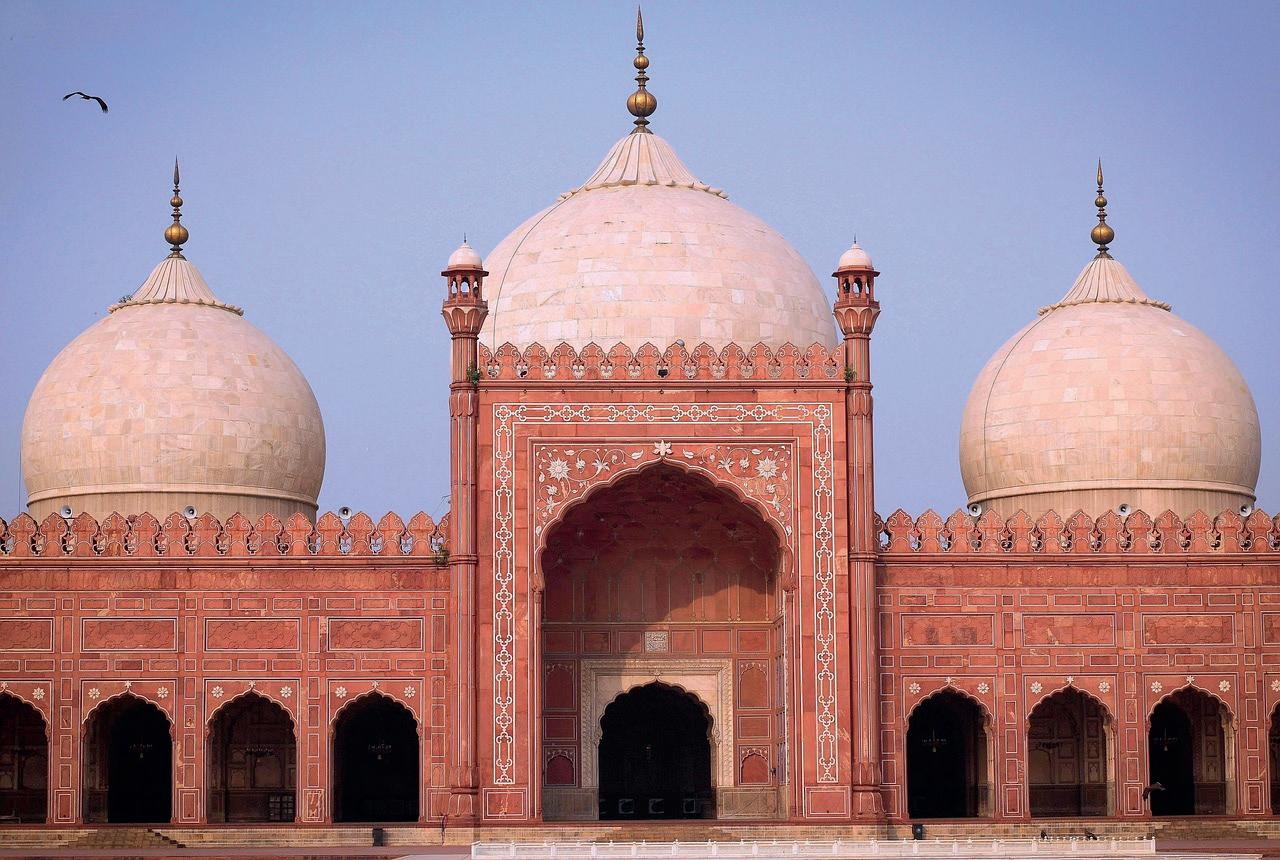
slaughtered, which in a way is part of the meat itself, or the blood from certain small birds that release very little blood upon being slaughtered and which is sometimes visible in the fine capillaries when eating their cooked meat – such blood is not forbidden and there is no harm in consuming it.”
Can janazah prayer be performed more than once for the same deceased person?
A missionary from the UK asked Hazrat Amirul Momineen, Khalifatul Masih Vaa, “If the Khalifa of the Time leads the hazir funeral prayer (i.e., where the dead body is present), but the burial is scheduled for a later day, can the janazah be performed again for the same person at the cemetery before the burial?
“Furthermore, on those Fridays when Huzooraa announces the passing of certain members and leads their funeral prayer after the Jumuah prayer, would it be considered an innovation [bid‘ah] if other mosques then also offer the funeral prayer in absentia for them?”
In his letter dated 25 March 2023, Huzoor-e-Anwaraa provided the following guidance in this regard:
“The janazah prayer is a collective obligation [fard kifayah]. Once it has been performed [by the Khalifa of the Time], there is no need to perform it again without a valid reason. When the Holy Prophetsa performed the funeral prayer for someone, the Companions did not subsequently repeat that person’s funeral prayer.
“However, there is evidence from the ahadith that if the Companions had performed the funeral prayer for a deceased person and buried them without the Holy Prophetsa having been informed of the person’s death, the Holy Prophetsa, out of compassion and mercy, would later perform the funeral prayer in absentia for that person. (Sahih al-Bukhari, Kitab al-jana’iz, Bab sufufi s-sibyans ma‘a r-rijali fi l-jana’iz; Sahih Muslim, Kitab al-jana’iz, Bab as-salati ‘ala l-qabr)
“Therefore, if the Khalifa of the Time has performed the hazir funeral prayer for someone once, there is no need to perform their hazir janazah again. The exception to this is if the burial is taking place some days later, and at that time, some of the deceased’s close relatives, who were unable to be present for the first funeral prayer, have also arrived. In such a case, taking into consideration the sentiments of these close relatives, there is no harm if the funeral prayer is offered again. However, without a legitimate reason, there is no need to repeatedly offer the funeral prayer.
“As for the respected elders, martyrs, or deceased individuals who have made extraordinary sacrifices, whose funeral prayer in absentia I lead after Friday prayers; if people who are offering the Friday prayer in other mosques wish to offer the funeral prayer in absentia for these individuals, it is neither obligatory nor forbidden. Moreover, for these mosques to offer their funeral prayer in absentia again is by no means a bid‘ah.”
Is it permissible to read the Quran directly from the mushaf while performing salat?
Someone wrote to Hazrat Amirul
Momineen, Khalifatul Masih Vaa, and asked the following questions:
“1. Is it permissible to read from the mushaf or a physical copy of the Holy Quran by placing it open in front of oneself during salat?
“2. What is the ruling concerning a person who, without any valid excuse, has not made up for the fasts they missed during the previous Ramadan by the time the next Ramadan arrives?
“3. Should a sick person pay the fidyah for missed fasts on a daily basis, or can they also pay it on the last day of Ramadan?”
In his letter dated 26 March 2023, Huzoor-e-Anwaraa provided the following answers to these questions:
“Allah the Exalted states in the Holy Quran:
“‘Recite, then, as much of the Qur’an as is easy [for you].’ (Surah al-Muzzammil, 73:21)
“Hazrat Mufti Muhammad Sadiqra writes in his book, Zikr-e-Habib:
“‘Dr Mirza Yaqub Baig Sahib once submitted to the Promised Messiahas that he was unable to memorise the long Surahs of the Holy Quran but desired to recite them in salat. He asked, ‘Is it possible for me to place the Holy Quran open on a Quran stand or a table, or to hold it in my hand, and after reciting, set it aside to perform the ruku‘ and sujud, and then pick it up again for the second rak‘ah?’ The Promised Messiahas replied, ‘What is the need for that? You should memorise a few Surahs and recite those.’ (Zikr-e-Habib […], p. 136)
“Therefore, one should recite in the prayers whatever of the Holy Quran one has memorised, and if one has the capacity, one should endeavour to memorise [more of] it. However, there is no need to read from the mushaf.”
What is the Islamic ruling if someone fails to make up for their missed Ramadan fasts before the beginning of the next Ramadan?
“If a person misses some fasts of Ramadan due to a valid reason, they should make up for them after the reason is no longer present and before the arrival of the next Ramadan. Indeed, this is the method mentioned in the ahadith concerning the Mothers of the Believers, may Allah be pleased with them.
(Sahih Muslim, Kitab as-siyam, Bab qada’i ramadana fi sha‘ban)
“However, if someone has been unable to make up for these fasts, they can still observe them after the next Ramadan, because the Holy Quran has not imposed any condition that the fasts of Ramadan must be completed before the next Ramadan. Rather, by using the words, ‘
’ (Surah al-Baqarah, Ch.2: V.186), meaning, ‘[They] should complete the reckoning by fasting on a corresponding number of other days’, it has been left to a person’s convenience.
“Hazrat Musleh-e-Maudra states in this regard:
“‘It is indeed a Quranic injunction that one should not fast while on a journey or in a state of illness, and we stress this so that the Quranic command is not disrespected. However, those who take advantage of this excuse, who are able to fast yet do not, or
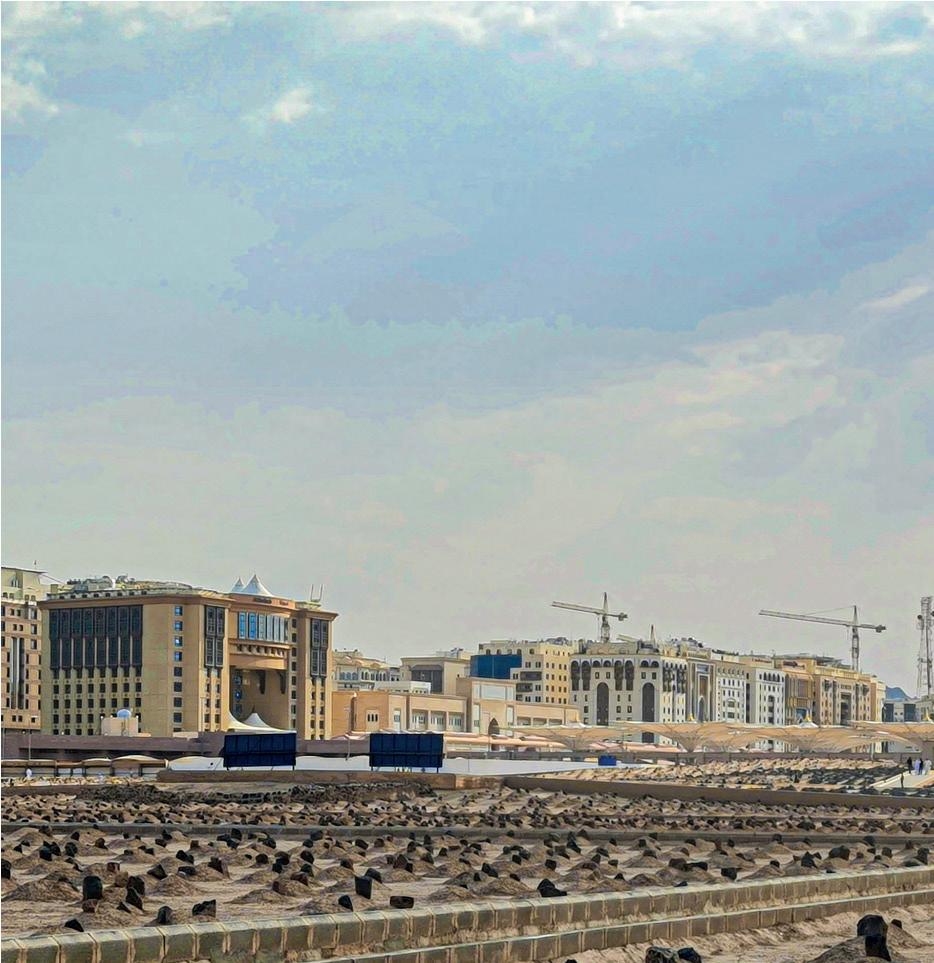

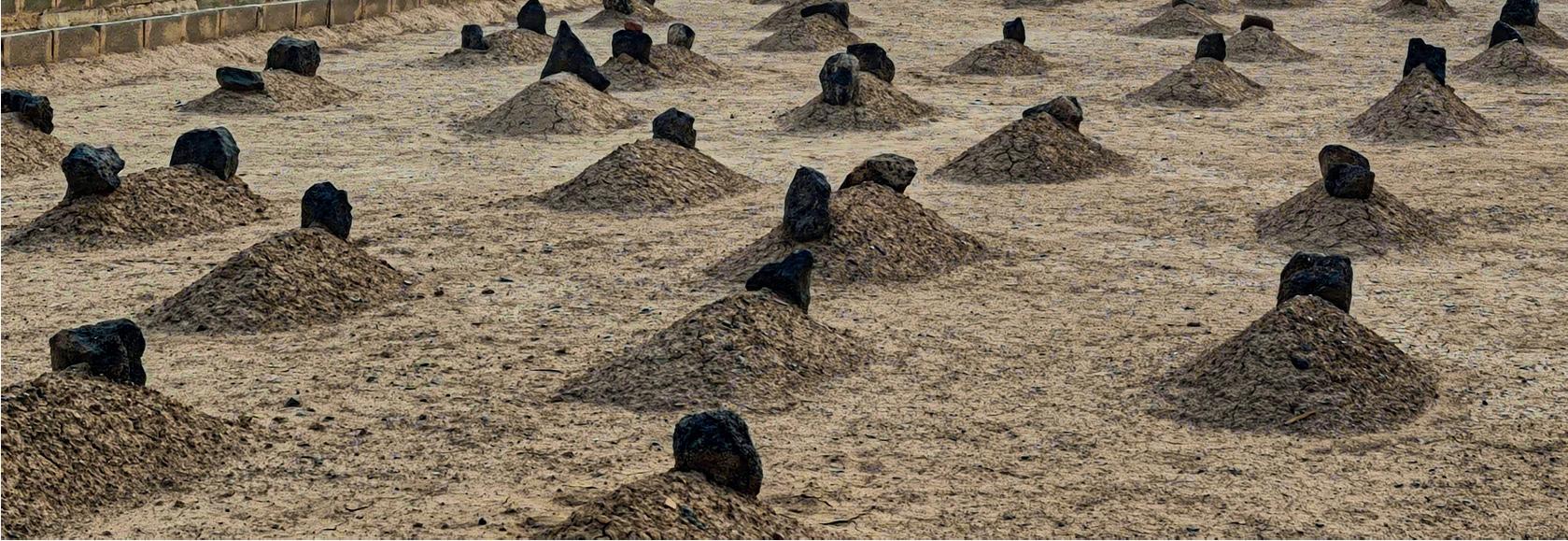

who have missed some fasts and could have completed them with effort but do not try to do so, they are sinners just as the one who does not fast in Ramadan without a valid excuse is a sinner. Therefore, every Ahmadi should make up for any fasts they have not kept due to some negligence or a valid excuse under Islamic law. Even if they have missed some of the fasts over a period of five or six years due to negligence or a valid religious excuse, they should complete those as well, so that they may be saved from punishment.’ (Al Fazl, Rabwah, 8 March 1961, p. 2; Farmudat-e-Musleh-e-Maw‘ud dar barah Fiqhi Masa’il, pp. 167-168)”
When and why should fidyah be paid for fasts missed due to illness or travel?
“If a person is unable to observe some fasts of Ramadan due to illness or travel, they should, according to their capacity, pay the fidyah for these missed fasts concurrently. The Promised Messiahas has also explained that one benefit of the fidyah is that it grants one the divine grace or ability [tawfiq] to be able to fast. Thus, he states: “‘Once, the thought came to my mind as to why the fidyah was instituted. I came to understand that it is for the sake of tawfiq, so that the divine grace to fast may be obtained through it. It is the Being of God alone who bestows tawfiq, and every single thing should be sought from God alone. God the Exalted is the All-Powerful; if He so wills, He can grant even an extremely feeble person the strength to fast. Thus, the purpose of the fidyah is precisely this: that this strength may be acquired, and this comes about by the grace of God. Therefore, in my view, it is excellent that one should pray, ‘O my God, this is a blessed month of Yours, and I am being left deprived of it. And what do I know whether I will be alive next year or not, or whether I will be able to make up for these missed fasts or not!’ If one seeks tawfiq from Him, then I am certain that God the Exalted will bestow strength upon such a heart.’ (Al Badr, No. 7, Vol. 1, 12 December 1902, p. 52)”
Are professionals like doctors permitted to go on strike according to Islamic teachings?
A doctor from the UK wrote to Hazrat
“There is currently widespread talk of doctors’ strikes. When we tell people that strikes are forbidden for Ahmadis, they reply that striking is a human right of employees and ask why we are not permitted to do so. They say this is an act that weakens the collective voice. What should be the response to this?”
In his letter dated 26 March 2023, Huzoore-Anwaraa provided the following guidance in this regard:
“If the law permits a strike, there is no harm in holding such a peaceful strike. However, even in this case, care should be taken to ensure that there is no form of vandalism and that no damage is caused to public or private property. During the blessed era of Hazrat Musleh-e-Maudra, when a protest was held in support of the Kashmiris, he granted Ahmadis permission at that time to participate in peaceful gatherings and protests.
“However, if a strike is prohibited by the government, one should not participate in it. Similarly, one should not participate in a strike that carries the risk of loss of life.
“As for the rest, instead of causing harm to patients or creating difficulties for them by going on strike to secure one’s rights, one should exert pressure on the government through the Members of Parliament in one’s respective areas, who have been elected by the people as their representatives. They should be informed that junior doctors also obtain their degrees after many years of study and after spending a substantial amount of money. If you pay them at a rate of 14 or 15 pounds per hour, then this too is an injustice, especially when, in comparison, a cleaner earns a higher wage.
“So, the government should also pay heed to this matter, because the duty of government officials is not merely to assume office and then only consider their own interests. Rather, the government is the guarantor for the protection of the rights of every citizen of the country. Therefore, the government should also strive to fulfil this public responsibility on a priority basis.”
(Compiled by Zaheer Ahmad Khan, Head of Records Department, Private Secretariat, London and translated by Al Hakam)
100 years ago...
Promoting unity and defending Islam: Ahmadiyya efforts in London and Mauritius
Hazrat Maulana Abdur Rahim Dardra (1894-1955)
Eid in London
Eid al-Adha was observed in London on Thursday, 2 July 2025. Since Thursday is not a day off for office workers, there were concerns that many might be unable to attend. However, by the grace of God, attendance nearly doubled compared to previous years.
First-time attendees
Among the participants were Mr Saeed Wilson, who resides in the town of Leifer, approximately 100 miles from London, and Mrs Yunus Evans, who had travelled from Portsmouth. Both were joining our Eid celebrations for the first time.
Sermon on the philosophy of sacrifice
Following the Eid prayer, I delivered a sermon focused on the philosophy of sacrifice and the true significance of Eid al-Adha. The sermon included an announcement regarding the advent of the Promised Messiahas and an invitation to accept him.
Recitation of Arabic qasidah
After the sermon, Malik Ghulam Farid Sahib[ra] recited several Arabic verses from the qasidah, Ya aina faizillahi wal irfani, composed by the Promised Messiahas. These were translated and explained for the benefit of the audience, who greatly appreciated the presentation.
Expression of brotherhood
Mr Muhammad Alam Sahib, who had travelled from Manchester, expressed his great happiness at seeing such a large gathering of Muslims in London. He proposed that all attendees exchange greetings and introduce themselves to one another in a spirit of Islamic brotherhood. This suggestion was warmly received, and everyone greeted and embraced one another with Eid Mubarak.
Traditional lunch and prayers
At 1:30 pm, a traditional Indian lunch was served. Afterwards, Zuhr and Asr prayers were offered. Mr Mateen and Mr Malik Ismail also took photographs to share with friends and for possible publication in newspapers.
A lecture and other speeches
At 3:00 pm, Malik Sahib was scheduled to deliver a lecture. Mr Dean commenced
the session with a recitation from the Holy Quran. This was followed by Mrs Hina Clark, who recited an English poem in tribute to the Promised Messiahas and Hazrat Khalifatul Masih II[ra]
Malik Sahib then delivered a lecture in which he shed light on the domestic life of the Holy Prophet Muhammadsa, using it as a means to establish his truthfulness and noble character.
Following this, Mr Abdullah Yusuf Ali, a retired officer of the Indian Civil Service (ICS), delivered a speech on the truth of Islam. He stated that while he was not a member of the Ahmadiyya Muslim Community, he deeply valued the community’s service to Islam and their missionary efforts. He also expressed his willingness to support their endeavours wherever possible.
After the speeches, tea was served. Mr Muhammad Iqbal recited a poem composed by the Promised Messiahas entitled Jamalo husne Quran noore jane har musalman hai, which delighted the audience. This was followed by remarks from Mr Morden, a barrister, and Mr Loftus Hare, [joint honourary] secretary of the conference of religions. Both expressed gratitude and conveyed their joy at the success of the Eid programme.
The gathering concluded with a silent prayer led by this humble one, bringing the day’s events to a formal and blessed close.
Below are the names of some prominent participants:
1. Mr Martin Late, General Secretary, Nigeria
2. Dr AM Shah, London
3. Justice Liyaqat Ali, Bhopal
4. Mrs Loftus Hare
5. Mr Knight Chorley
6. Nawab Abdul Majid, Hyderabad
7. Dr & Madam Leon MA, PhD
8. Mrs Sheldrake
9. Mr Coll
Token of thanks
This report would be incomplete without expressing my heartfelt gratitude to Syed Inaamullah Shah Sahib of Sialkot. He was entrusted with the food arrangements, which he managed with exceptional dedication and selflessness.
The success of Eid was greatly enhanced by the efforts and guidance of Syed Wazarat Hussain Sahib. He arranged for the display of a revelation of the Promised Messiahas, “I shall exalt thy name [...] to the corners of the Earth,” an advertisement for The Review of Religions, and an Eid Mubarak banner –all prominently placed. He also lit incense to enhance the atmosphere and had the community flag hoisted. Additionally, he
was in charge of the bookstall, where several attendees purchased literature.
In the distribution of food, both Syed Sahib and our dear brother Zafar Haq Khan Sahib rendered significant assistance.
Special appreciation is due to Mr Azizuddin Sahib, his wife, and Mrs Martin, who undertook the responsibility of preparing and serving tea. They also provided invaluable assistance in various aspects of the meal service, demonstrating tireless effort and excellence throughout.
May Allah Almighty grant them the best of rewards.
Wassalam Abdur Rahim Dard
Eid in Mauritius
Hazrat Sufi Ghulam Muhammadra BA (1881-1947)
On Thursday, 2 July 1925, Eid al-Adha prayer was held at Darus Salaam, Rose Hill. Nearly all Ahmadi members of the community were in attendance, with the exception of a few who were either unwell or otherwise incapable. A meal of pilau was served, and a strong appeal was made for participation in the ‘One Hundred Thousand’ scheme.
Activities of the Arya Samaj
At present, the state of tabligh – by the grace of God – appears favourable for our efforts. Mr Jemini Mehta, an Arya Samajist lawyer from Rangoon [now Yangon], is currently visiting Mauritius. His arrival has sparked renewed enthusiasm within the Arya Samaj circles. In Mauritius, the majority of Hindus belong to the Shudra class, while Brahmins and Kshatriyas are very few in number.
Although Arya Samaj branches have been established in many parts of the island, their organisational structures were in disarray. Mr Mehta has been invited to Mauritius to bring reform and order to these branches. Among local Hindus, strict castebased restrictions are observed: Brahmins do not shake hands with anyone outside their caste, and Kshatriyas likewise only with other Kshatriyas. However, Brahmins do extend handshakes to Muslims and Christians. Because the Arya Samaj permits caste mobility, where even Chamars can become ‘Brahmins’ by undergoing the Dvija (twice-born) rite, many among the lower castes, including Chamars, are affiliated with the Arya Samaj. Kshatriya and Brahmin adherents, on the other hand, are exceedingly rare.
Invitation extended to the Arya Samaj
The Arya Samaj also maintains music ensembles, which attract many young Hindus who join primarily for singing and musical activities. Each local Arya Samaj branch invites Mr Jemini Mehta for one week at a time to speak at their local gatherings. Mr Mehta knows only English and Urdu and typically presents the views of Europeans in his gatherings. However, he does not teach directly from the Vedas.
We sent an invitation informing him that we conduct regular Quranic study sessions at Darus Salaam and extended a cordial invitation to him and senior members of the Arya Samaj to attend. We proposed a reciprocal arrangement: on one Sunday, we would present a lesson on the Holy Quran, and on the following Sunday, the Arya Samaj should deliver a structured lesson from the Vedas, beginning from the fundamentals, and invite us to attend. However, Mr Mehta declined, stating that such an arrangement would be too difficult to carry out.
A conversation with an Arya Samajist
Seven of us, all Ahmadis, were invited to attend the wedding procession (baraat) of a Sanatan Hindu. On 27 June, we travelled to Souillac. We were received with great respect and accommodated in a separate house. There, we offered the Maghrib and Isha prayers and had our evening meal.
After some time, an Arya Samajist Hindu addressed me and asked, “Qadiani Sahib, where does the soul go after death?” I responded, “It comes from God and returns to Him.” From this exchange, the conversation naturally transitioned to the topic of reincarnation, and eventually to meat consumption.
Meat-eating and the Vedas
When I pointed out that meat consumption is mentioned in Yajur Veda, Chapter 21, Mantra 42, all the Hindus present were visibly startled. They admitted, “We have no response to this.” They then brought a Pandit to sit before me. The Pandit replied, “A single shabd (word) can have multiple meanings. The eating of meat is forbidden for satvagun.”
Knowledge of the Vedas
I repeatedly requested that the Yajur Veda be brought forth, but they continued to make excuses. They claimed even Swami
You are what you eat Islamic guidance on halal and haram foods
Jalees Ahmad Al Hakam
As the saying goes, you are what you eat, great emphasis is placed on the foods we use to fuel our bodies. What we put into our bodies determines how well they function. If we consume unhealthy foods, we can expect an unhealthy lifestyle to follow. However, if we eat nutritious and wholesome foods, we begin to feel better and perform at our best. (Foods linked to better brainpower, 3 April 2024)
Here, the question remains: how do we know what’s good or bad to eat? What foods do our bodies require to work at their best? Take pork, for example, why is it impermissible to consume? In Islam, pork is haram because the Holy Quran clearly says so. Some also mention health reasons, like how pigs eat anything and can carry diseases. But the main reason we avoid it is because Allah told us not to, and as Muslims, we follow His guidance.
As Muslims, we have a complete code and guide, the concepts of halal and haram, to help us determine what is permissible and what is not. What is haram is not just forbidden, it is harmful; and perhaps that’s exactly why it’s haram in the first place.
What the Holy Quran declares as haram
Dead meat, i.e. al maitah
“Forbidden to you is [the flesh of an animal] which dies of itself.” (Surah al-Ma’idah, Ch.5: V.4)
The word to describe dead meat in the Quran is ۃُتَیۡمَلۡا. Any animal that dies of
Continued from previous page
Dayanand Saraswati did not fully understand the Vedas – since it takes 20 years just to study the Daya Karan. According to Swami Dayanand’s own writings, it takes twelve years to study a single Veda. Thus, studying all four Vedas would require 48 years. Assuming that at least the first five years of life are not counted as scholarly years, this adds up to 73 years – yet Swami Dayanand lived only 59 years.
As a result of this exchange, word quickly spread throughout the area that “The Qadiani Maulvi proved, from the Yajur Veda in front of a Pandit, that meat-eating is indeed permitted.”
Arya Samaj propaganda
The Arya Samaj publishes a weekly newspaper – half in English and half in Hindi. Similarly, the Sanatan [Hindus] have a daily newspaper. In these papers, objections against Islam raised by Mr Jemini are regularly published.
In response, a Muslim wrote and published several articles addressing these objections. However, the Sanatani newspaper decided to discontinue the
itself, without proper Islamic slaughter, is haram
Dead meat, or carrion, is the flesh of animals that die naturally, without slaughter. It is deemed unhygienic and spiritually impure. Proper Islamic slaughter ensures that the blood of the animal, zabiha, is drained and the animal is treated humanely and made lawful through the name of Allah.
Blood and flesh of swine
Flowing or congealed blood is also forbidden. Further, all parts of the pig are haram, not just the meat.
“Blood and the flesh of swine.” (Surah al-Ma’idah, Ch.5: V.4)
Blood, and that too flowing blood, is considered a medium for impurities and harmful bacteria. The religion of Islam promotes the consumption of clean and healthy meat. Completely draining the blood aids in removing contaminants.
Further, the Holy Quran is clear on the fact that the flesh of swine is forbidden. Pig is considered impure. It’s associated with dirt, disease, and overall spiritual uncleanliness. As Muslims, we are taught how Islam also highlights adherence to divine laws even when full reasons are not always known; in this case, the impurity is stated clearly.
Animals slaughtered in the name of one other than Allah
The matter of halal and haram holds both physical and spiritual significance. For example, slaughtering an animal in Allah’s name reflects gratitude and acknowledgement of His provision. As Muslims, everything we do is done in the name of Allah. Whether it’s praying, feeding
debate thereafter. The Arya Samaj paper also refrains from publishing any rebuttals. Many ordinary Muslims have now been requesting us to respond to these allegations, which we intend to do through the distribution of informative tracts.
Request for prayers
I am developing a growth over my right eye, which is making reading and writing extremely difficult. I request friends to kindly pray that Allah the Almighty grants me a full recovery.
– Ghulam Muhammad
Sacrifices of Nairobi Ahmadis
Friends may have read in Al Fazl, dated 30 April [1925], that, by the grace and mercy of Allah the Almighty and through the prayers of Hazrat Khalifatul Masih II[ra], the Ahmadi members in Africa purchased an Ahmadiyya Hall and still contributed generously to the appeal of ‘One Hundred Thousand.’ Their names and donations have already been published in the newspaper. […]
(Translated by Al Hakam from the original Urdu, published in the 4 and 8 August 1925 issue of Al Fazl)
others, acting with kindness, or giving charity, it is all for Allah alone. If, when slaughtering, another name is mentioned (like idols or spirits), it becomes shirk, and thus the meat becomes invalid and haram for Muslims to consume.
Forbidden for Muslims is also “that on which is invoked the name of one other than Allah” (Surah al-Ma’idah, Ch.5: V.4)
Strangled, beaten to death, fallen, gored, or partially eaten by wild animals
The Holy Quran, whilst listing forbidden meat states: “and that which has been strangled; and that beaten to death; and that killed by a fall; and that which has been gored to death; and that of which a wild animal has eaten, except that which you have properly slaughtered.” (Surah alMa’idah, Ch.5: V.4)
The words used in the Quran to describe these are:
Munkhaniqah (ۃُقنخنمَلۡا) meaning: An animal that dies from strangulation (e.g. caught by the neck or suffocated).
Mawquzah (ةذوقومَلۡا) meaning: An animal that dies after being struck or beaten (e.g. with a blunt object).
Mutaraddiyah (ۃُيدرتمَلۡا) meaning: An animal that falls from a height (like off a cliff or roof) and dies from the fall.
Nateehah (ۃُحيطنلۡا) meaning: An animal that dies from being gored or butted by another animal (like in a fight).
These four ways of death, mentioned above, are unnatural, often painful, and thus cause suffering. As a result, these methods can lead to the animal being unhealthy and the blood not being properly drained.
Vermin and reptiles
Now arises the question of animals such as snakes, insects, rats, and the like. Although these are generally not considered food, it is worth addressing whether they are lawful to eat in Islam, should the question come to mind.
The Holy Quran states: “and makes lawful for them the good things and forbids them the bad.” Here, such creatures can also be linked to things that are harmful to one’s health or generally considered repulsive. Rats, for example, are known to carry diseases such as the plague. Likewise, snakes carry poison and venom, which pose serious health risks. Therefore, eating such creatures should not even be considered.
Intoxicants
All forms of alcohol and drugs that negatively alter the mind are haram.
“O ye who believe! wine and the game of hazard and idols and divining arrows are only an abomination of Satan’s handiwork. So shun each one of them that you may prosper.” (Surah al-Ma’idah, Ch.5: V.91)
Intoxicants alter the mind and impair judgment. As such, they are a leading cause of sinful behaviour. In Islam, great emphasis is placed on mental clarity, as it is one of the key criteria for forming intentions. Without the right intention, even prayer can become invalid. What clouds the intellect distances a person from remembering Allah and moral action.

This is why alcohol is referred to in Arabic as sakar (ركَسَ), which comes from the root word sakara (ركَسَ), meaning ‘to cover’ or ‘to veil.’ It is so named because it clouds or covers the intellect and the ability to think clearly.
Two matters Hadith states about halal and haram
The Holy Quran outlines the main criteria for what is lawful and unlawful in terms of food. However, not all forbidden foods are mentioned explicitly. The Holy Prophetsa further clarified and expanded on these rulings through his sayings and practices.
1. Animals with fangs
Animals with fangs are typically carnivores and beasts of prey. The Holy Prophetsa forbade the consumption of the meat of such animals. (Sahih al-Bukhari, Hadith 5530)
These animals, such as lions, tigers, wolves, etc., are predators and feed on other animals’ blood and corpses. Their nature is fierce, and their meat is neither clean nor wholesome. This is why Islam prefers that Muslims consume herbivores that are tamed and clean.
2. Birds with talons
The Holy Prophetsa forbade the eating of every beast of prey with fangs, and every bird with talons. (Sunan Abi Dawud, Hadith 3803)
These birds, for example eagles or owls, are scavengers and predators. Such birds eat dead flesh and are seen as impure and unfit for human consumption.
Exception: In case if necessity
Where the Holy Quran states foods that are unlawful and must not be consumed, Allah has, however, recognised that there must be exceptions in cases of necessity. And thus, Allah states:
“But he who is driven by necessity, being neither disobedient nor exceeding the limit, it shall be no sin for him.” (Surah alBaqarah, Ch.2: V.173)
This means that if a Muslim is starving and no halal food is available, eating haram becomes permissible to preserve life. However, even in this case God has stated “neither disobedient nor exceeding the limit”. Islam values life and flexibility in times of hardship.
Conclusion
Thus, when analysed through the Islamic lens, it becomes clear why certain things are halal and haram. The primary concern of Shari’a in matters of haram and halal, is to nourish the body in the best possible way, enabling us to maximise its performance. For who better knows what the body requires than its Creator?
HRH The Duke of Edinburgh visits Baitul Futuh Mosque to honour award-winning gardens
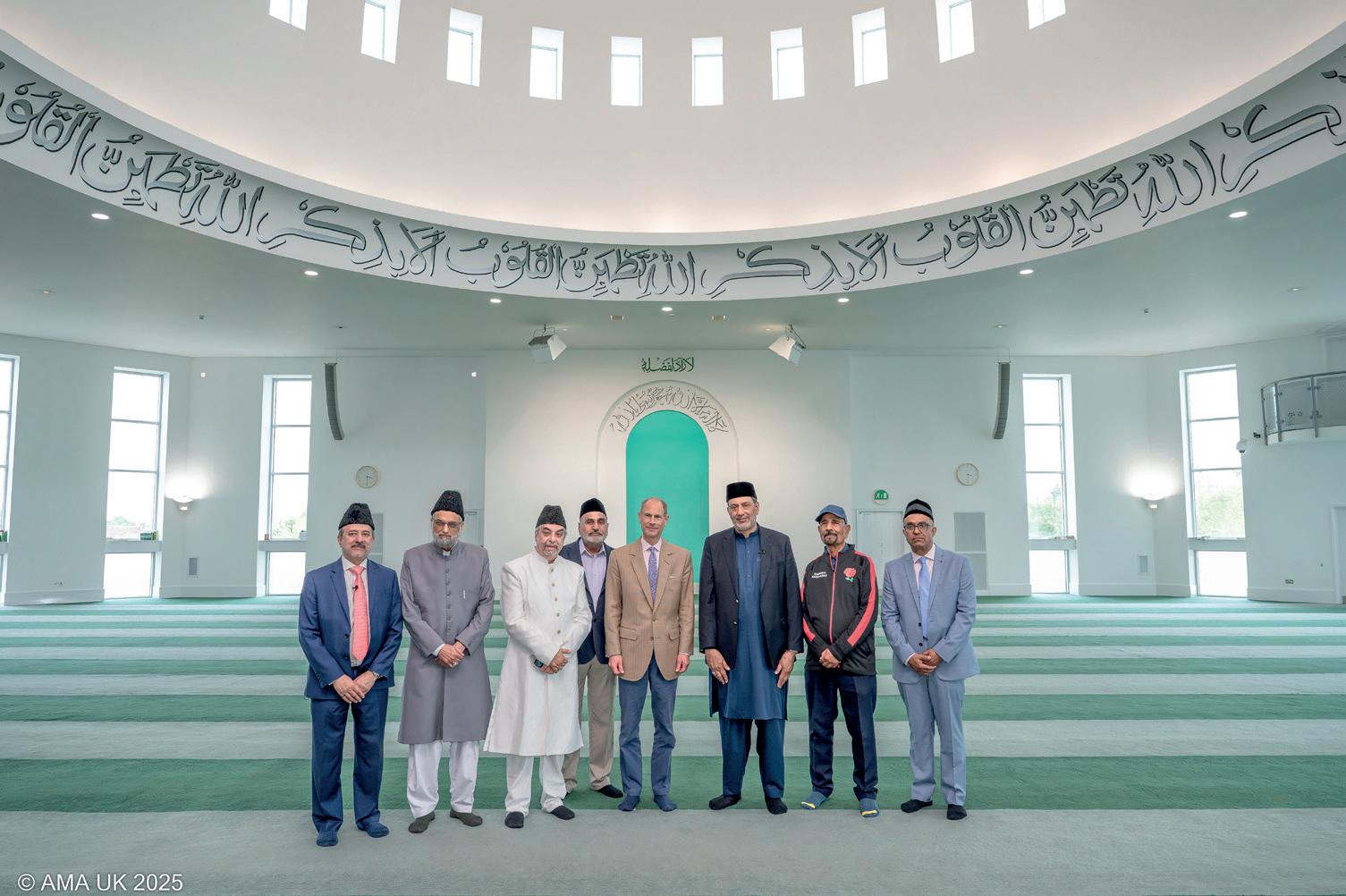
Staff Reporter Al Hakam
Morden, 25 July 2025: By the grace of Allah, the Baitul Futuh Mosque in Morden, UK – Western Europe’s largest mosque
complex – welcomed His Royal Highness Prince Edward, the Duke of Edinburgh, for a reception recognising the mosque’s continued horticultural excellence in the London Gardens Society competition.
The visit took place on Friday, 25
Irish Muslim youth in Galway organise charity walk to support local charities
Atta-ur-Rahman Khalid Missionary, Dublin
At a time when anti-immigrant sentiment has been on the rise in Ireland, young Irish Ahmadi Muslims are leading by example – demonstrating through action the true Islamic values of charity, compassion and community integration.
Majlis Khuddam-ul-Ahmadiyya Ireland held its annual 5K Charity Walk on 22 June 2025, along the scenic Salthill Promenade in Galway. This year, funds raised are going towards supporting the Simon Communities of Ireland and the Croí Heart & Stroke Foundation.
In the lead-up to the event, the members have been actively volunteering their time to set up fundraising stalls across the country, engaging with the public to raise as much support as possible. The group of volunteers was diverse, including schoolchildren,

university students and professionals such as IT workers and doctors, etc. – all generously offering their time to give back to their communities.
These efforts culminated in this event, with volunteers arriving early in Salthill to set up the venue. Members of Lajna Imaillah Ireland also organised a food stall, with all proceeds going directly to the two chosen charities.
Despite some rain before and after the
July, coinciding with the first day of Jalsa Salana UK 2025. In his capacity as Patron of the London Gardens Society, His Royal Highness planted a commemorative English rose before presenting the Society’s award to representatives of the Zira‘at [i.e., Horticulture] Department of Jamaate-Ahmadiyya UK. The engagement is recorded in the Court Circular and by the Greater London Lieutenancy.
The Duke was formally received at the Baitul Futuh Mosque by Surgeon Commodore Dr Robin McNeill Love OStJ DL RN, the Representative Deputy Lieutenant for the London Borough of Merton. The borough’s civic leadership also attended.
The Baitul Futuh Mosque’s gardening team has secured London Gardens Society honours year-on-year: first prizes in 2021–2023 and, in 2024, the Richard Niazi Memorial Trophy in the Highest Class (Miscellaneous) category – recognition for sustained volunteer effort to beautify the mosque’s public spaces.
During the reception, Jamaat representatives introduced His Royal Highness to the background of the
event, the weather held up during the walk itself, with sunshine accompanying the over 100 participants, which included volunteers, community members and officials.
This year’s walk was notable not only for its cause but also for the dignitaries in attendance. Both the Mayor and Deputy Mayor of Galway City took part. The event was officially inaugurated by the Deputy Mayor, Cllr Alan Cheevers, who said:
“It’s a great honour to be here today. This is my first engagement as Deputy Mayor of Galway City. I asked the mayor if it would be possible for my first event that I could launch the walk here today because of my connection over many years with the Ahmadiyya Community and I’m so happy to see so many of the community here today.
[…] It’s a fantastic day, and it’s great to be here, and long may it continue. I’m sure that your youth organisation within the Ahmadiyya Community will continue to do this over the years to come.”
The newly elected Mayor, Cllr Mike Cubbard, also addressed attendees on behalf of Croí, stating:
“First off, thanks for the invitation; it’s great to be here. There’s always a really strong welcome whenever I come here. I really enjoy the friendship that I get from the community here. [...] Within Croí,
Ahmadiyya Muslim Jamaat, including its identity as an Islamic revival movement established by the Promised Messiah, Hazrat Mirza Ghulam Ahmadas, and the historic presentation of his jubilee treatise to Queen Victoria: A Gift for the Queen (Tohfa-eQaisariyyah). The Duke was presented with a copy of the Holy Quran, a leather-bound edition of The Philosophy of the Teachings of Islam, a collection of Hazrat Khalifatul Masih V’saa Peace Symposium addresses (Golden Principles of Justice and Peace), and a specially commissioned painting of the Baitul Futuh Mosque titled Beacon of Light Reflecting on the occasion, Rafiq Hayat Sahib, Amir Jamaat-e-Ahmadiyya UK, said the visit “not only celebrates the outstanding horticultural efforts of our volunteers but also reflects the enduring spirit of service, peace, and community that lies at the heart of our faith.”
His Royal Highness previously visited the Fazl Mosque in 2011, where he also had the honour of meeting Hazrat Mirza Masroor Ahmad, Khalifatul Masih Vaa
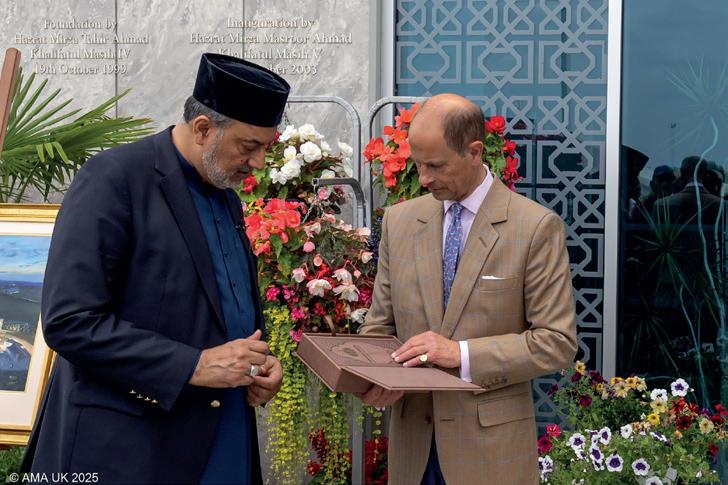
we’re funded 90% by fundraising like this. So again, once you take off today as a community in the 5K walk, know the fact that you are helping save lives, and that is crucial. On behalf of all the team in Croí, I say, ‘Go raibh maith agaibh go léir’ – Thank you so much, and enjoy the afternoon.”
Ibrahim Noonan Sahib, Missionary-InCharge of Jamaat Ireland, also delivered a speech and said:
“I would like to thank everyone here for making this walk possible because not only are we raising money for local funds and national charities, but it is also the fact that we want the people of Ireland, the people of Galway, to see that as a Muslim Youth organisation, and indeed our ladies organisation, that we care about this country, and we care about the people of this country, and that’s why we’re doing this.”
This year’s walk has raised a total of €10,300 thus far, exceeding the target of €10,000. The event also marked a major milestone for MKA Ireland: ten consecutive years of organising this charity walk. Since its inception in 2015, the Majlis has raised over €100,000 for Irish charities. You can support MKA Ireland in its fundraising efforts by visiting the event iDonate page: www. idonate.ie/event/AMYA5K25.
Friday Sermon
Mubarak Mosque, Islamabad, Tilford, UK
18 July 2025
Muhammadsa: The great exemplar
After reciting the tashahhud, ta’awwuz and Surah al-Fatihah, Hazrat Khalifatul Masih Vaa said:
Today, I will continue mentioning details pertaining to incidents from the Conquest of Mecca. The following are details concerning the length of the Holy Prophet’ssa stay in Mecca: After his arrival in Mecca and the Conquest of Mecca, the Holy Prophetsa remained there for a few days; however, there are varying accounts about the actual length of his stay.
According to [Sahih al-] Bukhari, it is narrated by Hazrat Ibn Abbasra that the Holy Prophetsa stayed in Mecca for 19 days. He would offer two units of prayer, meaning he would shorten his prayer [due to being in a state of travel]. Other narrations also mention 18 days, 17 days, and 15 days. Allama Ibn Hajr has given precedence to the narration which mentions 19 days, because most narrations mention 19 days. The other narrations can be reconciled in that the narration mentioning 19 days also includes the day of arrival and the day of departure. Those who have mentioned 17 days have not included the two days of arrival and departure. The narrators who have related 18 days have included only one of those days, whereas those narrators who have conveyed 15 days have taken the narration regarding 17 days as their basis and have then subtracted the days of arrival and departure, thus stating it as 15 days. (Subul al-Huda, Vol. 5, Dar Al-Kotob Al-Ilmiyah, Beirut, p. 261; Fath al-Bari, Vol. 2, Qadimi Kutub Khanah, Karachi, p. 715)
Certain orientalists have mentioned the Holy Prophet’ssa conquest of Mecca in their books. William Muir was a renowned orientalist from Scotland. Whilst mentioning the Conquest of Mecca in his book “The Life of Mohammad”, he has written about the Holy Prophet’ssa excellent example and says:
“It was indeed for his own interest to forgive the past (meaning to forgive all transgressions committed by the people), and cast into oblivion its slights and injuries. (After saying this, he cannot help
but say and accept the following reality): But this did not the less require a large and generous heart. And Mohammad had his reward, for the whole population of his native city at once gave in their adhesion, and espoused his cause with alacrity and apparent devotion. [...] Within a few weeks, we find two thousand of the citizens fighting faithfully by his side.” (The Life of Mahomet, London: Smith, Elder & Co., 15 Waterloo Place, 1878, pp. 425-426)
Similarly, William Montgomery is another Scottish orientalist who has also written and spoken very harshly against Islam and the Holy Prophetsa in his books. However, in one of his books, Muhammad at Medina he has written (I will read out the translation; I also read out a translation for the previous quote):
“These leaders were not forced to become Muslims (he is accepting this fact); they and doubtless many others remained pagan. Above all, however, his consummate skill in handling the confederacy he (meaning the Holy Prophetsa) now ruled, and making all but an insignificant minority feel they were being fairly treated, heightened the contrast between the feeling of harmony, satisfaction and zest in the Islamic community and the malaise elsewhere; this must have been obvious to many and have attracted them to Muhammad[sa]
In all this, one cannot but be impressed by Muhammad’s[sa] faith in his cause, his vision and his far-seeing wisdom. While his community was still small and devoting all its energies to avoiding being overwhelmed by its enemies, he had conceived a united Arabia directed outwards, in which the Meccans would play a new role, a role no less important than their old role of merchants. [...] And now practically all of them, even the greatest, had submitted to him. Against considerable odds, often with narrow margins, but nearly always with sureness of touch, he had moved towards his goal. If we were not convinced of the
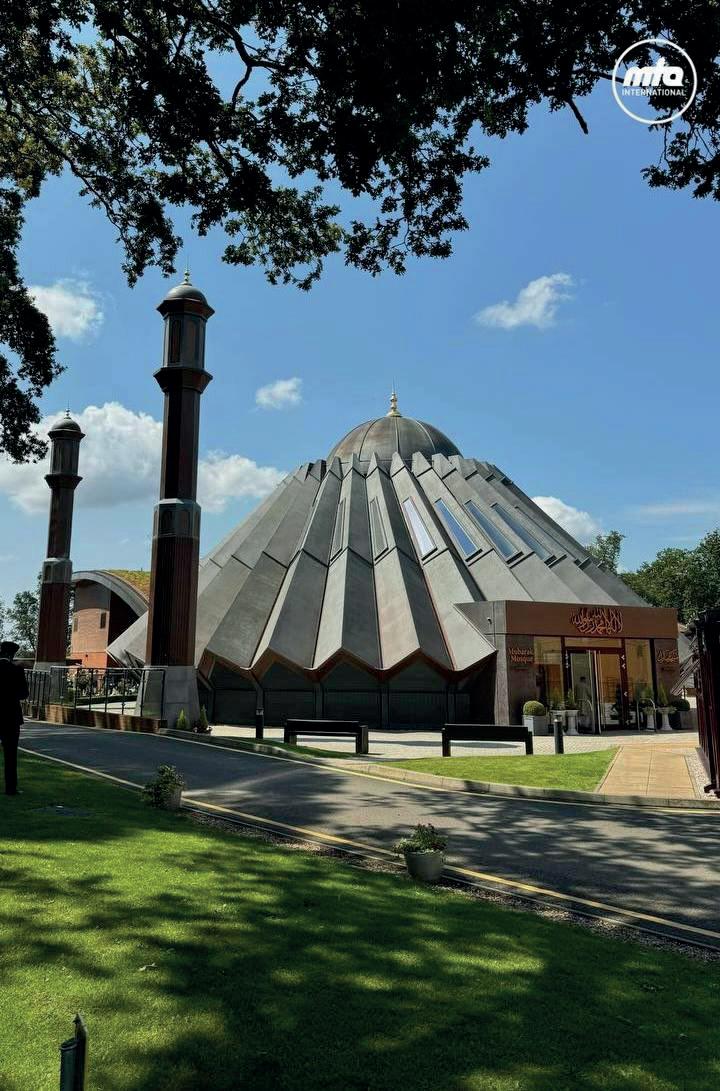
historicity of these things, few would credit that a despised Meccan prophet could reenter his city as a triumphant conqueror.”
(Muhammad at Medina, Ameena Saiyid, Oxford University Press, Karachi, 2006, pp. 67-68 and 70)
Then, there is another orientalist named Arthur Gilman from America who was also quite renowned. Whilst mentioning the Conquest of Mecca in his book The Saracens he has deemed the Holy Prophet’ssa general amnesty, his excellent example and tolerance as being exemplary, and writes:
“When Mohammed[sa], mounted on the same camel that had so faithfully carried him on other occasions, rode into the city, his heart rose in thankfulness, for he saw empty streets again, and knew that his reception was to be peaceful. It is greatly to his praise that on this occasion, when his resentment for ill-usage in the past might naturally have incited him to revenge, he restrained his army from all shedding of blood and showed every sign of humility and thanksgiving to Allah for his goodness. Kalid, it is true (he writes, as has also been previously mentioned with regard to the incident of Hazrat Khalid bin Walidra), did meet force with force at one point, but he was rebuked by Mohammed[sa]
“The prophet’s[sa] first labor was the destruction of the idol-images in the Kaaba, and after that had been done he ordered his original muezzin to sound the call to prayer from the top of the Kaaba, and sent a crier through the streets to command all persons to break in pieces every image that they might possess.”
He writes:
“Ten or twelve men who had on a former occasion shown a barbarous spirit, were proscribed, and of them four were put to death, but this must be considered exceedingly humane, in comparison with the acts of other conquerors; (he writes) in comparison for example, with the cruelty of the Crusaders, who, in 1099, put seventythousand Moslems, men, women, and helpless children, to death when Jerusalem fell into their hands; or with that of the English army, also fighting under the cross, which, in the year of grace, 1874, burned an African capital, in its war on the Gold Coast (the former name of Ghana). Mohammed’s[sa] victory was in very truth one of religion and not of politics; he rejected every token of personal homage, and declined all regal authority; and when the haughty chiefs of the Koreishites appeared before him he asked:
“‘What can you expect at my hands?’
“‘Mercy, O generous brother.’
“‘Be it so; ye are free!’ he exclaimed.” (The Saracenes, 4th Edition, T. Fisher Unwin, London, 1887, pp. 184-185)
Another orientalist is Ruth Cranston who was also from America. Whilst mentioning the Conquest of Mecca in her book World Faith (she is a female author) she writes:
“On a day early in the year 630, the man who had been stoned and hooted from the town ten short years before, accompanied by one terrified companion, now led his ten thousand seasoned troops into the city of Mecca. Mohammed[sa] had given orders that there should be no killing – the inhabitants were to be treated kindly. But his men were attacked—in spite of all the Meccan promises and undertakings; and
the Prophet[sa] had difficulty in restraining Khalid (now as a commander of his forces) from stern reprisals.” She has exaggerated in saying this; there were no assurances, and the Meccans were the first to attack. In any case, such prejudice typically manifests in one way or another. She further writes:
“Two Moslems and twenty-eight Meccans were killed. Imagine the carnage at such a time and on such an occasion if another leader had been in command! (Here she is compelled to accept the reality.)
“As soon as the Moslem troops were in control of the city, Mohammed changed his uniform for the white pilgrim robes. He performed the regulation pilgrim rites –seven times round the Kaaba. Then he called for the surviving companions – those who had risked all, again and again, for his cause – to stand beside him during the great event of the day and of his life. One by one, the 360 stone images – including the detested Hubal – were brought out of the shrine and dashed to pieces. With each destruction, Mohammed cried aloud:
“‘Truth is come – and falsehood is vanished!’” (World Faith, Skeffington Stratford Place, London, 1953, pp. 216-217)
Karen Armstrong is another good orientalist who is generally very fair in her writings. She was born in 1944 and is a renowned scholar and author of England who is known for her works on comparative religions. With reference to the Conquest of Mecca, she writes in her book, Muhammad: A Biography of the Prophet:
“He[sa] had no desire to begin bloody reprisals. Nobody was made to accept Islam, nor do they seem to have felt under pressure to do so. Muhammad[sa] did not want to coerce the people but to effect a reconciliation.
“He[sa] had come to Mecca not to persecute the Quraysh but to abolish the religion which had failed them. […] By conquering Mecca, Muhammad[sa] had vindicated his prophetic claim. But this conquest had been achieved without bloodshed and Muhammad’s [sa] peaceful policy paid off. Within a few years, paganism was quite dead in Mecca and some of Muhammad’s[sa] most committed enemies like Ikrimah and Suhayl became devout and fervent Muslims.” (Muhammad – A Biography of the Prophet, Book Readers International, Quetta, pp. 243 and 245)
Nevertheless, despite their fierce opposition, some Orientalists have been compelled to acknowledge the truth about certain matters, having no choice but to do so. There are additional events related to the conquest of Mecca as well.
One incident is in relation to the repentance of Abdullah bin Sa‘d bin Abi Sarh. It is recorded that he initially accepted Islam and served as a scribe for revelations. Later, however, he apostatised and returned to Mecca. It is reported that he was sentenced to death. After the conquest of Mecca, he sought refuge with Hazrat Uthman bin Affanra, who was his foster brother. Hazrat Uthmanra brought him before the Holy Prophetsa and requested that the Holy Prophetsa accept Abdullah’s pledge of allegiance. The Holy Prophetsa remained silent for some time, then accepted his Bai’at. When Abdullah bin Abi Sarh had left, the narrator mentioned that the Holy Prophetsa remarked to his Companions, “I remained silent, expecting one of you to rise
“When the pledge of allegiance for the general public was announced, Hazrat Uthmanra brought Abdullah and requested the Holy Prophetsa to accept his pledge. The Holy Prophetsa raised his blessed head, looked at him, and refused three times. After doing the same action three times, he finally accepted his pledge. Then, he addressed the Companions, “Was there no wise person among you who, upon noticing my refusal to accept his pledge, would have stood and executed him?” The Companions replied, “O Messengersa of Allah, how could we know what was in your heart? Why didn’t you signal with your eyes?” The Holy Prophetsa said, “It is unbecoming of a prophet to deceive with his eyes.
and swiftly execute him.” The Companions asked, “O Messengersa of Allah, why did you not give us a signal?” To this, the Holy Prophetsa replied, “It is not fitting for a prophet to signal toward killing someone.”
According to some narrations, the Holy Prophetsa stated, “It is not permissible for a prophet to commit treachery with the eyes.”
(Sirat Ibn Ishaq, Dar Al-Kotob Al-Ilmiyah, Beirut, pp. 529-530; Sirat Ibn Hisham, Dar Al-Kotob Al-Ilmiyah, Beirut, p. 742; AlIktifa’, Vol. 2, Alam al-Kutub, Beirut, p. 225)
Such narrations, along with similar ones, are found in certain historical books; hence, they are mentioned here. However, these accounts are doubtful, and the exemplary patience and character of the Holy Prophetsa prove that such narratives are likely fabricated.
A similar narration appears in Sunan an-Nasa’i, stating: During the conquest of Mecca, Abdullah bin Sa‘d hid in the house of Hazrat Uthmanra. When the pledge of allegiance for the general public was announced, Hazrat Uthmanra brought Abdullah and requested the Holy Prophetsa to accept his pledge. The Holy Prophetsa raised his blessed head, looked at him, and refused three times. After doing the same action three times, he finally accepted his pledge. Then, he addressed the Companions, “Was there no wise person among you who, upon noticing my refusal to accept his pledge, would have stood and executed him?” The Companions replied, “O Messengersa of Allah, how could we know what was in your heart? Why didn’t you signal with your eyes?” The Holy Prophetsa said, “It is unbecoming of a prophet to deceive with his eyes.” (Sunan an-Nasa’i, Kitab Tahrim ad-Dam, Bab alHukm fi al-Murtab, Hadith 4067)
Nevertheless, even this narration from Sunan an-Nasa’i is not necessarily authentic. This tradition is also found in Sunan Abu Dawood, but another narration within Abu Dawood omits any mention of execution.
(Sunan Abu Dawood, Kitab al-Hudud, Bab al-Hukm fi Man Istadda, Hadith 4359)
This narration is as follows: Hazrat Ibn Abbas narrates that Abdullah bin Sa‘d bin Abi Sarh was a scribe for the Holy Prophetsa, but Satan misled him, causing him to side with the disbelievers. On the day of Mecca’s conquest, the Holy Prophetsa ordered his execution. Hazrat Uthman bin Affanra interceded for his protection, upon which the Holy Prophetsa granted it. (Sunan Abu Dawood, Kitab al-Hudud, Bab al-Hukm fi Man Irtadda, Hadith 4358)
Regarding Abdullah bin Sa‘d, it is essential to clarify – as previously stated – that narrations from certain hadith collections regarding him have been critically assessed, and their chains of narration are considered weak. Suggesting the Holy Prophetsa remained silent, expecting the Companions to act, is improbable; he was a king, and thus could have explicitly stated his intentions. Another critical consideration is that Islam does not prescribe a penalty for apostasy; thus, suggesting Abdullah bin Sa’d was sentenced to death merely for apostasy is incorrect. Furthermore, it is also worth noting that the described details contradict the Holy Prophet’ssa noble character, as I have already mentioned. On that day [of the Conquest of Mecca,] the Holy Prophetsa epitomised Allah’s attributes of forgiveness, concealment of faults, mercy, and compassion. There was no one who sought forgiveness and was denied, even if a death sentence had previously been pronounced. This narration is absent from Sahih alBukhari and Sahih Muslim. Additionally, it contradicts rational analysis. As a victorious leader, if execution were necessary, why would the Holy Prophetsa hesitate or resort to subtle signals? When Hazrat Uthmanra brought Abdullah forward, the Holy Prophetsa could have openly declared his crimes unforgivable. Around the same time, the case of a woman from Banu Makhzum accused of theft was presented before the Holy Prophetsa, accompanied by significant intercession, including from Hazrat Umm Salamara and Hazrat Usama bin Zaidra. Yet, the Holy Prophetsa decisively rejected all
pleas and upheld the punishment of severing her hand. Therefore, had Abdullah bin Sa’d’s crime been so severe, the Holy Prophetsa would have openly stated that forgiveness was not possible.
Attributing to the Holy Prophetsa such actions that contradict basic ethical principles and traditions is unacceptable. It is fallacious to claim that when he came to pledge allegiance, the Holy Prophetsa remained silent, hoping someone would kill him. Furthermore, when this did not happen, the Holy Prophetsa questioned the Companions, who replied that he needed only to signal them with his eye; however, he refrained from doing so because a prophet does not deceive with his eyes. Through this narration, people wish to assert, God forbid, that the Holy Prophet’ssa true desire was for someone to kill him; however, he did not openly express it. This narrative inherently undermines its authenticity.
The exalted character of the Holy Prophetsa is far above such attributions. He was firm and resolute in implementing Allah’s laws and cared nothing for others’ opinions or reactions when justice was concerned. Yet, he was softer than silk when it came to forgiveness and mercy, harbouring no resentment or bitterness.
Therefore, narratives surrounding Abdullah bin Sa‘d’s allegiance are questionable, and some historians and biographers have rightly rejected these accounts.
In his commentary on verse 15 of Surah al-Mu’minun, Hazrat Musleh-e-Maudra mentions the following incident in the following manner:
“A historical event is associated with this verse, which seems necessary to mention here. (He writes:) The Holy Prophetsa had a scribe of revelation whose name was Abdullah bin Abi Sarh. When a revelation was sent down to the Holy Prophetsa, he would call him and have it written. One day, the Holy Prophetsa was having these very verses written down. When he reached the verse
‘Then We developed it into another creation.’ [23:15], the words
“‘So blessed be Allah, the Best of creators’ [23:15] spontaneously came out of the scribe’s mouth. The Holy Prophetsa said, ‘This indeed is the revelation – write it down.’
“But that unfortunate man did not realise that, as a natural conclusion to the previous verses, these words flowed appropriately. Instead, he thought that just as these words came out of his mouth and the Holy Prophetsa declared them to be revelation, likewise – God forbid – the Holy Prophetsa must be composing the Quran himself. As a result, he became an apostate and went to Mecca.
“On the occasion of the Victory of Mecca, among those whom the Holy Prophetsa had ordered to be killed was Abdullah bin Abi Sarh. However, Hazrat Uthmanra gave him protection, and he remained hidden in his house for three days. One day, while the Holy Prophetsa was taking the oath of allegiance from the people of Mecca, Hazrat Uthmanra brought Abdullah bin Abi Sarh before him and requested that his oath of allegiance be accepted. The Holy Prophetsa hesitated for a moment, but then accepted his oath of allegiance – and in this way, he re-entered Islam.” (Tafsir-e-Kabir, 2004, Vol. 6, p. 139)
Regarding Abdullah bin Abi Sarh, it is reported that he later came to be counted among the Companions who rendered distinguished services to Islam. He also served as the governor of Egypt and was the one who led the conquest of a region in Africa. After the martyrdom of Hazrat Uthmanra, he distanced himself from the civil strife, even though he was Hazrat Uthman’sra foster brother. It is said that he had prayed that his final deed be prayer –and so it happened that one day he stood for the morning prayer, and while concluding the prayer, after saying salam to the right, he was just about to say salam to the left when he passed away. He died in the year 36 or 37 Hijri. (Usd al-Ghabah, Vol. 3, Dar Al-Kotob Al-Ilmiyah, Beirut, pp. 260-261)
Then there is the account of Ikrimah bin Abi Jahl accepting Islam. Ikrimah bin Abi Jahl was among those whose killing the Holy Prophetsa had ordered on the occasion of the Conquest of Mecca. Ikrimah and his father used to harm the Holy Prophetsa and were extremely harsh towards the Muslims. When he found out that the Holy Prophetsa had ordered his execution, he fled towards Yemen. Despite the fact that in his enmity towards Islam he had even surpassed his father, Abu Jahl – and it is possible that this is what led to the command for his killing – it is also quite likely that those chiefs and leaders of Mecca who had always been at the forefront of opposing Islam – and who constantly plotted against Islam and the Holy Prophetsa – after the conquest of Mecca, assumed that their deeds were such that there was no way they could be forgiven, and they would surely be killed. So assuming this, they fled on their own.
In reality, they had no expectation of the Holy Prophet’ssa extraordinary mercy, pardon, and forgiveness, nor any real understanding of it. That is why they thought it best to save their lives and escape. But as they came to know more about the Holy Prophet’ssa unparalleled forgiveness and grace, they began to feel drawn back towards Mecca and returned to the Holy Prophetsa and presented themselves before him.
In any case, Ikrimah was among those prominent opponents who fiercely resisted the Muslim army even at the time of the Conquest of Mecca. He gathered a group with him that included the brave young men of Mecca, among whom were Suhail bin Amr and Safwan bin Umayyah, and they drew their swords, declaring that they would not allow the Muslims to enter Mecca. They firmly confronted the battalion of Hazrat Khalid bin Walidra, but after more than twenty of their young men were killed, all of them fled from there, and Suhail, Safwan, and Ikrimah – all three – fled from Mecca.
In historical accounts, it is mentioned that Ikrimah had decided to travel to Yemen by sea. His wife, Umm Hakim bint Harith bin Hisham, who was the daughter of a chief of the Quraish, pledged allegiance on the occasion of the Conquest of Mecca along with Hind bint Utbah and other influential women. When she learnt that her husband, Ikrimah, had fled towards Yemen out of fear for his life, she came to the Holy Prophetsa and submitted, “Ikrimah fears that you will have him killed. I implore you to grant him protection.” The Holy Prophetsa responded, “He is under my protection.”
She then departed with her servant and
made her way towards Jeddah, where she found Ikrimah on the seashore, just as he was preparing to board a ship. According to one narration, she reached him after he had already boarded the vessel. She called out to him, saying, “O son of my uncle! I have come to you from a man who is the most devoted in upholding ties, the most righteous among all people, and the most sincere well-wisher of all the people. Do not cast yourself into ruin, for I have already secured protection for you.”
Moved by her words, Ikrimah returned with his wife and accepted Islam, and his acceptance of the faith proved to be most blessed and beautiful.
It is narrated that when Ikrimah presented himself before the Holy Prophetsa, he said, “O Muhammadsa, my wife has informed me that you have granted me protection – meaning, you have permitted me to remain in Mecca even while I remain in a state of disbelief, and not on the condition that I accept Islam.” The Holy Prophetsa replied, “You have spoken the truth. Indeed, you are under protection.”
At this, Ikrimah declared, “I bear witness that there is none worthy of worship except Allah. He is One and has no partner, and you are His servant and His Messenger.” Then, he lowered his head in embarrassment.
The Holy Prophetsa, then, said, “O Ikrimah, today whatever you ask of me, if it is within my power, I shall surely grant it to you.” Ikrimah submitted, “Then pray for the forgiveness of all the enmity I harboured against you.”
Upon this, the Holy Prophetsa offered the following prayer: “O Allah! Forgive every instance of hostility that Ikrimah displayed towards me, and every ill word or deed he committed.” The Holy Prophetsa was so pleased that he then placed his own cloak upon Ikrimah and declared with affection and honour, “Welcome! To the one who has come to us as a believer and a migrant in the cause of God.” (Al-Sirah al-Halabiyyah, Vol. 3, Dar Al-Kotob Al-Ilmiyah, Beirut, p. 132; Subul al-Huda, Vol. 5, Dar Al-Kotob AlIlmiyah, Beirut, pp. 227-228; Fath al-Bari, Vol. 8, Qadimi Kutub Khanah, Karachi, p. 13; Usd al-Ghabah, Vol. 4, Dar Al-Kotob AlIlmiyah, Beirut, p. 67; Muhammad Bashmil, Fath Makkah, Nafis Academy, Karachi, pp. 307 and 327-328)
There is also mention of the fulfilment of a prophecy attached to the acceptance of Islam by Ikrimah, which has been mentioned by Hazrat Musleh-e-Maudra. He writes:
“With the acceptance of Islam by Ikrimah, a prophecy was fulfilled, one that the Holy Prophet Muhammadsa had conveyed to his Companions many years earlier. The Holy Prophetsa said:
“‘I saw in a dream that I was in Paradise. There I saw a cluster of grapes and asked the people around me, “For whom is this fruit?” Someone replied, “It is for Abu Jahl.”
This seemed strange to me, and I thought, “How can this be? No one enters Paradise except the believers. How then is Abu Jahl to receive grapes in Paradise?”’
“When Ikrimah accepted Islam, the Holy Prophetsa explained, ‘That cluster was meant for Ikrimah. In the dream, God mentioned the name of the father in place of the son, something which is commonly found in dreams.’” (Dibacha Tafsirul Quran, Anwar-ul-Ulum, Vol. 20, p. 350)
In relation to Habbar bin Aswad’s fleeing and then later accepting Islam, it is written that Habbar bin Aswad was known in the Days of Ignorance for his eloquence, and he would often incite the people against the Holy Prophetsa. Moreover, he was a person of extremely foul morals.
When the daughter of the Holy Prophetsa, Hazrat Zainabra, undertook her migration to Medina, she was expecting at the time. Habbar bin Aswad caused her camel to be startled, resulting in her falling from the mount and caused the miscarriage of her unborn child. Due to this injury, she remained in a state of illness until the end of her life.
Owing to this, the Holy Prophetsa had given a directive for him to be slain wherever he might be found. At the time of the conquest of Mecca, in fear of retribution, Habbar fled from Mecca and went into hiding among the wilderness and deserts.
After the conquest of Mecca and the subsequent return of the Holy Prophetsa to Medina, Habbar, ventured to present himself before the Holy Prophetsa. When he approached, the Companionsra recognised him and immediately informed the Holy Prophetsa that Habbar was coming.
The Holy Prophetsa replied, “Yes, I have seen him. Do not take any action against him.”
Habbar then drew near and submitted:
“O Messenger of Allah, peace be upon you. I bear witness that there is none worthy of worship except Allah, and I bear witness that you are His Messenger. I have fled from you, wandering through various places and even sought refuge among non-Arabs. But then I recalled your grace, your forbearance, and the kindness you extend even to those who transgress against you. O Messengersa of Allah, we were once idolaters, and it is through you that Allah has guided us and delivered us from ruin. I implore you to forgive my transgressions and the pain I have caused you. I confess my misdeeds and sins.”
The narrator relates that at that moment, he observed the countenance of the Holy Prophetsa. The Holy Prophetsa, overwhelmed by modesty and compassion, lowered his gaze in silence. After a pause, he said:
“I have forgiven you. Verily, Islam wipes away all previous sins.” (Waqidi, Kitab alMaghazi, Vol. 2, Dar Al-Kotob Al-Ilmiyah, Beirut, p. 282; Muhammad Bashmil, Fath Makkah, Nafis Academy, Karachi, pp. 331333)
Hazrat Musleh-e-Maudra has also recorded this incident, stating:
“Among those individuals for whom the Holy Prophetsa had issued orders of the death penalty, was a man who had become the cause of the demise of the Holy Prophet’ssa noble daughter, Hazrat Zainabra
“This man’s name was Habbar. During the migration of Hazrat Zainabra, he had severed the girth strap of her camel’s saddle – a strap that secures the saddle firmly. As a result, Hazrat Zainabra fell from the camel, leading to the miscarriage of her unborn child. Not long thereafter, she passed away. This grievous act, in addition to other crimes he had committed, rendered him deserving of death.
“However, this very individual later came into the blessed presence of the Holy Prophetsa and submitted:
“‘O Prophet of Allah, I had fled from you
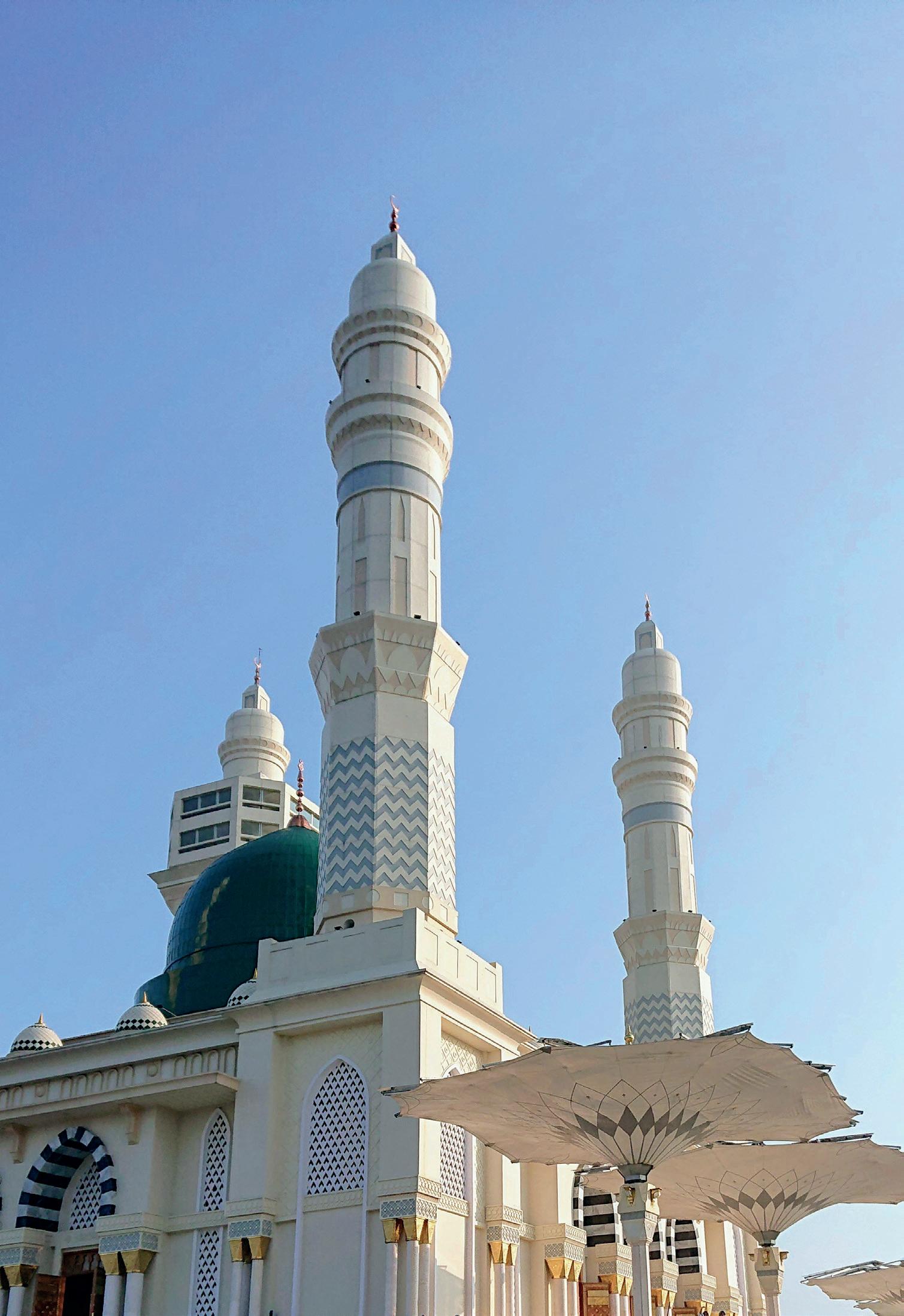
and journeyed towards Persia. But then I reflected and thought to myself: it is through this Prophet that Allah the Almighty has removed from us the darkness of shirk (idolatry) and saved us from spiritual destruction. Why should I seek shelter among strangers, when instead I could go to him, confess my transgressions, and implore his forgiveness?’
“The Holy Prophetsa stated:
“‘O Habbar, when Allah has instilled the love of Islam within your heart, then why should I not forgive your sins? Go – for I have forgiven you. Indeed, Islam erases all that has gone before.’” (Dibacha Tafsirul Quran, Anwar-ul-Ulum, Vol. 20, pp. 350351; Ferozul Lughat Urdu, Feroz Sons, p. 385)
How is it that the Holy Prophetsa forgave him, yet it is claimed that he did not forgive Abdullah and was asked whether a signal or gesture could have been made and upon this the Holy Prophetsa stated that there was no need.
Another individual was Kaʿb bin Zuhayr bin Abi Aslami. In the 7th year of Hijrah, Ka b and his brother Bujayr arrived at a place called Abrak, a well belonging to the Banu Asad, located along the route from Basrah to Medina. From there, Bujayr journeyed on to Medina and accepted Islam. This news
stayed with an acquaintance. The next morning, that acquaintance brought him to the Holy Prophetsa. After the Holy Prophetsa had completed the morning prayer, the companion pointed out the Holy Prophetsa to Kaʿb and said, “This is the Messengersa of Allah. Stand and seek his protection.”
Kaʿb rose, sat before the Holy Prophetsa, and placing his hand in the blessed hand of the Holy Prophetsa. None among the Companions present recognised him.
He then addressed the Holy Prophetsa, saying:
“O Messengersa of Allah, Kaʿb bin Zuhayr seeks protection and forgiveness, having repented and wants to come to you. If I were to bring him before you, would you accept his repentance?”
The Holy Prophetsa replied, “Yes.”
At this, Ka b declared, “I am Ka b bin Zuhayr.” Hearing this, an Ansari Companion rose and said:
“O Messengersa of Allah, hand over this enemy of God to me so that I may strike his neck.”
But the Holy Prophetsa responded with compassion:
“Let him be. He has come in repentance and regret.”
Kaʿb then recited his poem, and when he reached the couplet:
When he awoke, the mantle was reportedly still on his shoulders, and he – having been paralysed – was miraculously healed. This, however, is a story that is narrated and passed down; such accounts do appear from time to time. (Diwan Imam Busiri, Dar alSalam Printing Press, Lahore, pp. 32-33)
In any case, there are numerous examples of staunch opponents who ultimately accepted Islam and were forgiven. InshaAllah, these accounts shall be mentioned in future.
From next Friday, insha-Allah, the Jalsa Salana of Jamaat-e-Ahmadiyya UK will also begin. Pray for that as well. May Allah the Almighty bless the Jalsa with His grace and continue to bestow His blessings on each and every programme. May Allah protect against every mischief-maker, every harmful person, and anyone with the intent to cause harm.
May Allah the Almighty bring safely all those guests who are coming from within the country or from abroad, and may He keep them in His protection in every way while they are here. May Allah the Almighty grant every host the ability to fulfil the duty of hospitality – whether the guests are coming personally to stay with individuals, or are being hosted under the Jamaat’s formal hospitality arrangements.
greatly angered Kaʿb, who then composed satirical verses [against the Holy Prophetsa].
Although many narrations suggest that it was due to these satirical poems that the Holy Prophetsa ordered Ka b’s execution, certain circumstantial details indicate a deeper matter: that Kaʿb and Bujayr may have conspired to harm or assassinate the Holy Prophetsa. It is surmised that Kaʿb deliberately remained at a distance from Medina, while sending his brother ahead, [with ill intent]. However, Bujayr embraced Islam.
Upon hearing of his brother’s conversion, Kaʿb became extremely angry. However, later – when the Holy Prophetsa returned from the expedition of Ta’if – Bujayr wrote to his brother, exhorting him to repent and submit himself to the Holy Prophetsa, for the Holy Prophetsa was known to forgive everyone who would come to him in a state of repentance.
Having no alternative other than presenting himself before the Holy Prophetsa, Kaʿb composed a qasidah [poem in praise of the Holy Prophetsa]. The opening verse was:
“Suʿad has departed, and my heart today is torn with grief.”
Kaʿb then travelled to Medina and
“Verily, the Messengersa of Allah is a radiant light by which guidance is sought, A sharp, unsheathed Indian sword from among the swords of Allah.”
The Holy Prophetsa, removed his blessed mantle which he had over him and draped it over Hazrat Ka’b. It was due to this gesture that the poem came to be known as the Qasidah al-Burdah i.e. “The Poem of the Mantle.” Because “Burdah” means mantle. It is also referred to as Qasidah Banat Su ad
Later, Hazrat Amir Muʿawiyah expressed a desire to purchase this blessed mantle for a large sum from Hazrat Ka’b, but he declined, saying:
“I shall never part with this blessed garment bestowed upon me by the Messengersa of Allah.”
After Hazrat Kaʿb’s demise, Hazrat Amir Muʿawiyah acquired the mantle from his heirs, and thereafter it passed down through the rulers of the Banu Umayyah, until it was lost following the fall of their dynasty. (Ka’b bin Zuhair aur Qasidah Banat Sa’ad, Maktabah Ishaqiah, Karachi, pp. 6-7; AlSirah al-Halabiyyah, Vol. 3, Dar Al-Kotob Al-Ilmiyah, Beirut, pp. 301-302; Al-Lu’lu’ al’Maknun Sirat Encyclopaedia, Vol. 9, Dar al-Salam, p. 393; Muntaha al-Su’al, ala Wasa’il al-Wusul ila Shama’il al-Rasulsa, Vol. 3, Dar al-Minhaj, p. 166; Farhang-e-Sirat, Zawar Academy, Karachi, p. 24)
It is worth noting that among the people today, another poem is more widely recognised by the same name – Qasidah al-Burdah – composed by Imam Sharaf-udDin al-Busiri. It is said that when he wrote this poem in praise of the Holy Prophetsa, the Holy Prophetsa appeared to him in a dream and wrapped him in his blessed mantle.
The workers who enthusiastically and passionately offer themselves for Jalsa duties – may Allah the Almighty enable all of them to serve selflessly in their respective departments, and may they serve the guests with utmost respect, kindness and cheerfulness.
Sometimes, due to the burden of work and lack of sleep, the cheerful spirit of some workers may waver. However, every worker, regardless of their role or department, should spend these days with the thought that Allah the Almighty has granted us the opportunity to serve the guests of the Promised Messiahas and therefore we shall uphold our passion to offer every kind of sacrifice and not show any kind of wrong attitude and always maintain smiles on our faces.
Whether young girls or women, young boys or elderly men, officers or assistants, those who prepare food and manage the kitchen arrangements, those who serve the food, those on security duty, those working in the parking area, those working in hygiene and cleaning, those maintain the discipline inside and outside of the Jalsa Gah, the workers assigned at the entrance gates, the girls serving in the children’s marque, or the girls, boys, men, and women serving in the main Jalsa Gah – all must carry out their duties with a smile on their face at all times. May Allah the Almighty grant them this ability.
At the same time, a vigilant eye should be maintained on everyone so that no one can even have the courage to spread any mischief or harm. May Allah the Almighty enable all workers to serve in the best possible manner and become recipients of His blessings.
(Official Urdu transcript published in the Daily Al Fazl International, 8 August 2025, pp. 2-6. Translated by The Review of Religions.)
